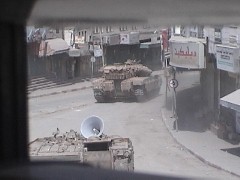 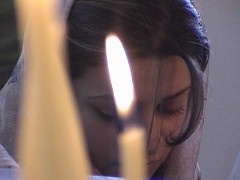 The
sounds of Zababdeh: The
sounds of Zababdeh:
3:00 AM, Rooster (3 sec.) 3:00 AM, Dogs (5 sec.) 4:45 AM, Muslim prayer (40 sec.) 6:00 AM, Church bells (40 sec.) 7:30 AM, National Anthem (40 sec.) 20 hrs./day, Generator (5 sec.) |
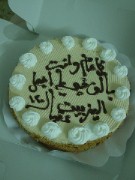 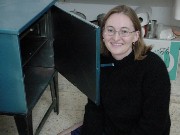 Tuesday, 10/1/02: Today Tubas
remained closed. Marthame subbed for an English teacher, but three
Tuesday, 10/1/02: Today Tubas
remained closed. Marthame subbed for an English teacher, but three 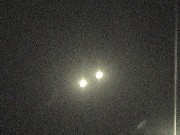 others
were absent as well as a bus full of children. This has become all-too-familiar
and all-too-annoying. The school simply can't function "as normal"
in a situation like this. Later in the afternoon, Marthame ran into
a friend who had spent all day yesterday at the Israeli "checkpoint" between
'Aqaba and Tubas. He had left in the morning, making his way to Jerusalem
Open University's extension program in Tubas. He, along with another
200 young men, were detained for questioning and background checks, accompanied
by verbal and physical harassment. Finally, at 11:00 p.m., he was
released and sent home to Zababdeh - on foot. Another productive
day in Palestine. In the evening, we celebrated Elizabeth's birthday
a few days early. We wanted to make sure that friends from the Arab-American
University would be able to come, as a few of them were leaving town
soon. This is the third year in a row that Elizabeth has received
an appliance as a gift (somehow fitting in this culture), but it's what
she's been asking for. In the evening, as Marthame got ready for
travel tomorrow, he could see flares over Tubas. What's happening,
one can only guess. others
were absent as well as a bus full of children. This has become all-too-familiar
and all-too-annoying. The school simply can't function "as normal"
in a situation like this. Later in the afternoon, Marthame ran into
a friend who had spent all day yesterday at the Israeli "checkpoint" between
'Aqaba and Tubas. He had left in the morning, making his way to Jerusalem
Open University's extension program in Tubas. He, along with another
200 young men, were detained for questioning and background checks, accompanied
by verbal and physical harassment. Finally, at 11:00 p.m., he was
released and sent home to Zababdeh - on foot. Another productive
day in Palestine. In the evening, we celebrated Elizabeth's birthday
a few days early. We wanted to make sure that friends from the Arab-American
University would be able to come, as a few of them were leaving town
soon. This is the third year in a row that Elizabeth has received
an appliance as a gift (somehow fitting in this culture), but it's what
she's been asking for. In the evening, as Marthame got ready for
travel tomorrow, he could see flares over Tubas. What's happening,
one can only guess. |
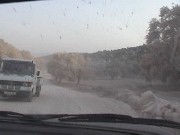 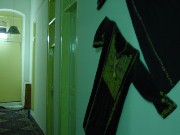 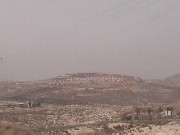 Wednesday, 10/2/02: Marthame and a friend from the University
headed down to Jerusalem today, taking
the backroads meant for tractors, sheep, and goats (and not the cars and
18-wheelers that travel them by necessity). The trip was without
incident - the northern Jalame checkpoint was a breeze, and the trip through
the Jordan Valley road was fine. The number of new and expanding
settlements is not encouraging, though. Marthame was able to start
with our visa paperwork (due to expire in a few months, but starting early
with Israeli bureacracy is always a good idea), pick up some hand-embroidered
clergy stoles he had orded from Sunbula,
and to rendevous with friends while staying in the faded glory of the New
Imperial Hotel at Jaffa Gate. There was little time to do much else
but get ready for tomorrow's travel.
Wednesday, 10/2/02: Marthame and a friend from the University
headed down to Jerusalem today, taking
the backroads meant for tractors, sheep, and goats (and not the cars and
18-wheelers that travel them by necessity). The trip was without
incident - the northern Jalame checkpoint was a breeze, and the trip through
the Jordan Valley road was fine. The number of new and expanding
settlements is not encouraging, though. Marthame was able to start
with our visa paperwork (due to expire in a few months, but starting early
with Israeli bureacracy is always a good idea), pick up some hand-embroidered
clergy stoles he had orded from Sunbula,
and to rendevous with friends while staying in the faded glory of the New
Imperial Hotel at Jaffa Gate. There was little time to do much else
but get ready for tomorrow's travel. |
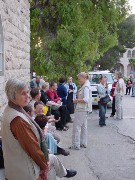 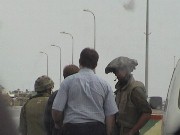 Thursday, 10/3/02: Marthame left the Hotel at 5:30 a.m. and went
towards Augusta Victoria Hospital on the Mount of Olives. A few days
ago, we had gotten a call that there was to be a supply of medicine delivered
to Nablus and they were asking for foreign
volunteers to accompany the delivery - it guarantees the best possible
security that the shipment will be able to negotiate the checkpoints and
arrive. The organizations responsible for such relief efforts (in
this case, the Mennonite Central Committee,
Lutheran
World Federation, World Vision International,
and Catholic Relief Services)
do these trips frequently, organizing with the Israeli military authorities
ahead of time, sending them the passport, ID, and vehicle numbers of all
involved. After some brief instructions (audio
- 3 sec.), ten vehicles set out, including one truck of medicine.
The convoy traveled along the main West Bank artery, a road which has been
closed off to Palestinian traffic for more than a year now. It was
the first time either of us had traveled it in quite a while. The
convoy arrived at Huwara, a village on the outskirts of Nablus which has
been under curfew for basically two years. At the same checkpoint,
we were stopped three times and asked for our passports, IDs, etc.
The first time, we were told we could not enter - so much for coordination.
A simply phone call to the captain took care of that, and we moved to the
second stoppage. Same story. As we waited, we saw several young
women trying to enter the city. They were Palestinians, but were
speaking English with the soldier. He eventually allowed all of them
to pass, except for one. She began to cry, hiding her tears in
Thursday, 10/3/02: Marthame left the Hotel at 5:30 a.m. and went
towards Augusta Victoria Hospital on the Mount of Olives. A few days
ago, we had gotten a call that there was to be a supply of medicine delivered
to Nablus and they were asking for foreign
volunteers to accompany the delivery - it guarantees the best possible
security that the shipment will be able to negotiate the checkpoints and
arrive. The organizations responsible for such relief efforts (in
this case, the Mennonite Central Committee,
Lutheran
World Federation, World Vision International,
and Catholic Relief Services)
do these trips frequently, organizing with the Israeli military authorities
ahead of time, sending them the passport, ID, and vehicle numbers of all
involved. After some brief instructions (audio
- 3 sec.), ten vehicles set out, including one truck of medicine.
The convoy traveled along the main West Bank artery, a road which has been
closed off to Palestinian traffic for more than a year now. It was
the first time either of us had traveled it in quite a while. The
convoy arrived at Huwara, a village on the outskirts of Nablus which has
been under curfew for basically two years. At the same checkpoint,
we were stopped three times and asked for our passports, IDs, etc.
The first time, we were told we could not enter - so much for coordination.
A simply phone call to the captain took care of that, and we moved to the
second stoppage. Same story. As we waited, we saw several young
women trying to enter the city. They were Palestinians, but were
speaking English with the soldier. He eventually allowed all of them
to pass, except for one. She began to cry, hiding her tears in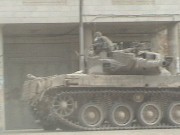 embarrassment, and began figuring out how she would get back to Ramallah
from there. The third time, we were told that everyone except those
traveling with Jerusalem IDs could enter - that left out about half of
our group, including all of the drivers, so we waited again for coordination
to take place. It did and we entered the city. The streets
were empty, except for the presence of Israeli tanks and jeeps and those
who had been detained by them for breaking curfew. The place is a
wreck - trash is piling up, the basic civil infrastructure - streets, sidewalks,
curbs, signs - have been crushed and damaged by tanks. Buildings
are riddled with bulletholes. It reminded Marthame of so many places we
saw in Lebanon - streets lined with scarred, hollow reminders of a brighter
past. We arrived at the Anglican Hospital, where Marthame parted company
with the convoy and met up with Fr. Hosam. Further into the heart
of the city, the curfew wasn't as tightly enforced today, so there was
some freedom to sneak out and around.
embarrassment, and began figuring out how she would get back to Ramallah
from there. The third time, we were told that everyone except those
traveling with Jerusalem IDs could enter - that left out about half of
our group, including all of the drivers, so we waited again for coordination
to take place. It did and we entered the city. The streets
were empty, except for the presence of Israeli tanks and jeeps and those
who had been detained by them for breaking curfew. The place is a
wreck - trash is piling up, the basic civil infrastructure - streets, sidewalks,
curbs, signs - have been crushed and damaged by tanks. Buildings
are riddled with bulletholes. It reminded Marthame of so many places we
saw in Lebanon - streets lined with scarred, hollow reminders of a brighter
past. We arrived at the Anglican Hospital, where Marthame parted company
with the convoy and met up with Fr. Hosam. Further into the heart
of the city, the curfew wasn't as tightly enforced today, so there was
some freedom to sneak out and around. 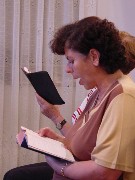 Marthame dropped off some long-overdue supplies to the Latin priest and
school in Nablus and Rafidia before retiring to the Anglican compound on
the edge of the Old City. The exterior wall of the convent along
the main street has been destroyed by tanks (or tank fire). The electricity
in the area has been damaged, leaving exposed wires hanging. The
neighborhood children have a made a game of kicking a soccer ball against
the wall until the positive and
Marthame dropped off some long-overdue supplies to the Latin priest and
school in Nablus and Rafidia before retiring to the Anglican compound on
the edge of the Old City. The exterior wall of the convent along
the main street has been destroyed by tanks (or tank fire). The electricity
in the area has been damaged, leaving exposed wires hanging. The
neighborhood children have a made a game of kicking a soccer ball against
the wall until the positive and 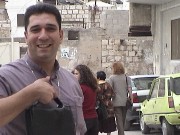 negative
connect, making cool sparks (and cutting off the electricity in the neighborhood
temporarily). A few days ago, a neighborhood boy was killed at the
door of the compound - he had wandered from home, curious to see a tank
as it approached. One bullet was all it took - a ten-year-old "martyr"
(of Palestine, or of curiosity?). Marthame went with Fr. Hosam to
an evening hymn sing (audio - 10 sec.)
and Bible Study at the church in the Rafidia neighborhood of the city.
It has been three months since the group last met, and this time they gathered
only with great temerity - adjourning after half an hour for the sake of
the safety of the parishioners. Meanwhile, back in Zababdeh, the
first rain - a small sprinkle - came today. It happened a couple
hours after school, and kids grinned widely at the good fortune of rain.
We often recall with humor how we grew up with "Rain rain go away - come
again another day." No such sentiment here. Later, from 4:30
until 7:30 in the evening, the Israeli army came back to the nearby military
camp and set off four rounds of dynamite, finishing off the last of the
camp buildings. The first time, people rushed to their roofs to see
what the huge boom was, and they found a mini-mushroom cloud of smoke and
dust rising over the camp (unfortunately, the cameras were with Marthame
in Nablus). The booms were unnerving, but thankfully harmless, and
the dust clouds were oddly elegant as they rose and dispersed in the sky.
At any rate, it looks like they won't be back. Back in Nablus, we
sat out on the porch in the evening - no one dares be out on the streets
at night, even when people are breaking the curfew, because of the risks
involved - sitting and chatting with a neighbor who works for the Palestinian
intelligence and listening to his radio crackle with news of the latest
movements of the Israeli army. Seems like it'll be a relatively quiet
night in this neck of the woods. negative
connect, making cool sparks (and cutting off the electricity in the neighborhood
temporarily). A few days ago, a neighborhood boy was killed at the
door of the compound - he had wandered from home, curious to see a tank
as it approached. One bullet was all it took - a ten-year-old "martyr"
(of Palestine, or of curiosity?). Marthame went with Fr. Hosam to
an evening hymn sing (audio - 10 sec.)
and Bible Study at the church in the Rafidia neighborhood of the city.
It has been three months since the group last met, and this time they gathered
only with great temerity - adjourning after half an hour for the sake of
the safety of the parishioners. Meanwhile, back in Zababdeh, the
first rain - a small sprinkle - came today. It happened a couple
hours after school, and kids grinned widely at the good fortune of rain.
We often recall with humor how we grew up with "Rain rain go away - come
again another day." No such sentiment here. Later, from 4:30
until 7:30 in the evening, the Israeli army came back to the nearby military
camp and set off four rounds of dynamite, finishing off the last of the
camp buildings. The first time, people rushed to their roofs to see
what the huge boom was, and they found a mini-mushroom cloud of smoke and
dust rising over the camp (unfortunately, the cameras were with Marthame
in Nablus). The booms were unnerving, but thankfully harmless, and
the dust clouds were oddly elegant as they rose and dispersed in the sky.
At any rate, it looks like they won't be back. Back in Nablus, we
sat out on the porch in the evening - no one dares be out on the streets
at night, even when people are breaking the curfew, because of the risks
involved - sitting and chatting with a neighbor who works for the Palestinian
intelligence and listening to his radio crackle with news of the latest
movements of the Israeli army. Seems like it'll be a relatively quiet
night in this neck of the woods. |
|
Friday, 10/4/02: Elizabeth's 30th birthday, spent relaxing, knitting, reading, websurfing, and talking to family. Rather than being distressed by no longer being a twentysomething, Elizabeth is suprisingly content to move into what she calls her second trimester of life. That feeling is buttressed by her completion this year of her (seemingly interminable) Master's degree. ilhamdulillah. And today she tucked another accomplishment under her belt: she finished knitting the sweater she's been working on for about 8 years (first envisaged as an Icelandic cardigan, then unraveled to be remade a free-style pullover). Now she plans to start a hat, hoping to finish it before she's 60. Meanwhile, in Nablus, curfew is in place again today, but people are moving around a bit - being Friday, things'll be quieter anyway. In the morning, Marthame went to meet Fr. Hosam for "Sunday" School - the first meeting in months, too. Unfortunately, Marthame was an hour late - the time changed last night (falling back), but for some reason it takes everybody a few days to get on the same page about whether to meet on "summer time" or "winter time". The two of them went over to the Melkite Convent in Rafidia to wait for a delivery of relief supplies from Caritas-Jerusalem. It gave Marthame a chance to reconnect with Fr. Joseph (Melkite), Fr. George (Orthodox), and Fr. Jalil (Roman Catholic - originally from Zababdeh, no less). Everyone is enjoying the collective "resistance" to curfew, something that has only emerged consistently in the last 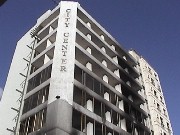 four
or five days. We waited, drank coffee, waited some more, and drank
some more coffee. Eventually, the call came that Caritas was turned
back at the Huwara checkpoint and was going to make alternative delivery
plans. Once again, the army's word is worth as much as the paper
it's written on. Marthame went off with a friend to have lunch and
visit with his family (and their two adorable girls). The conversation
focused on politics and history mostly, as do most conversations here.
"You know when we'll have a Palestinian state?" he asked. "When we
have a Ghandi." Perhaps so. After lunch, the two of us headed
down towards the Anglican Compound in Nablus, first taking a "death and
destruction" driving tour of the city. The closer we got to the center
of town, the thinner the traffic got, an indication of the presence of
the military. Everywhere are the signs of battle - one is the burned-out
hull of the City Center, a fifteen-story mall at the center of town.
A few weeks back, there were army tanks parked in front, engaging in a
fire fight with the local shabab (young men). The soldiers
eventually four
or five days. We waited, drank coffee, waited some more, and drank
some more coffee. Eventually, the call came that Caritas was turned
back at the Huwara checkpoint and was going to make alternative delivery
plans. Once again, the army's word is worth as much as the paper
it's written on. Marthame went off with a friend to have lunch and
visit with his family (and their two adorable girls). The conversation
focused on politics and history mostly, as do most conversations here.
"You know when we'll have a Palestinian state?" he asked. "When we
have a Ghandi." Perhaps so. After lunch, the two of us headed
down towards the Anglican Compound in Nablus, first taking a "death and
destruction" driving tour of the city. The closer we got to the center
of town, the thinner the traffic got, an indication of the presence of
the military. Everywhere are the signs of battle - one is the burned-out
hull of the City Center, a fifteen-story mall at the center of town.
A few weeks back, there were army tanks parked in front, engaging in a
fire fight with the local shabab (young men). The soldiers
eventually 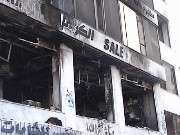 turned
and open fire on the empty City Center, engulfing it in flames and sending
the security glass showering to the ground. It crunched under our
feet like fresh snow as we walked (audio
- 5 sec.). As we pulled up to the Muqat'a, the old Palestinian Authority
offices, we could see a tank pull away from a nearby intersection.
The main road into Nablus, which runs right by the building, has been bulldozed
and piled high with dirt - it wasn't long ago that such a sight was unusual
to us. Now, it's so commonplace it's hardly worth mentioning.
The building, which turned
and open fire on the empty City Center, engulfing it in flames and sending
the security glass showering to the ground. It crunched under our
feet like fresh snow as we walked (audio
- 5 sec.). As we pulled up to the Muqat'a, the old Palestinian Authority
offices, we could see a tank pull away from a nearby intersection.
The main road into Nablus, which runs right by the building, has been bulldozed
and piled high with dirt - it wasn't long ago that such a sight was unusual
to us. Now, it's so commonplace it's hardly worth mentioning.
The building, which 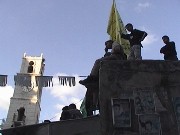 dates
originally from the time of the British Mandate period, is in ruins - F-16s
took care of that. The same is true of cars, fountains...Next door
stands what remains of the city jail. "See that number 7?
That was my cell." The life-cycle of public buildings seems to be:
Turkish, British, Jordanian, Israeli, Palestinian, rubble. Our friend
had been arrested on twenty different occasions, doing his time as a political
prisoner in the early 1980's, before the first Intifada. He's
now a family man, but those early days of political and social activism
clearly linger in his heart. We tried to make our way back to the
Anglican church by passing through the Old City, but there was a rally
taking place - more defiance in the heart of Occupation and house arrest.
In the evening, those gathered in Nablus made an important phone call to
Zababdeh (now seemingly across an international border) to wish Elizabeth
a proper happy birthday - in both English and Arabic. It's another
quiet night - perhaps the worst has passed and Marthame won't get to experience
the hell people have been living here for the past four months. Fr.
Hosam sent a report to the Anglican Diocesan
offices in Jerusalem, describing his ministries in a suffocating city. dates
originally from the time of the British Mandate period, is in ruins - F-16s
took care of that. The same is true of cars, fountains...Next door
stands what remains of the city jail. "See that number 7?
That was my cell." The life-cycle of public buildings seems to be:
Turkish, British, Jordanian, Israeli, Palestinian, rubble. Our friend
had been arrested on twenty different occasions, doing his time as a political
prisoner in the early 1980's, before the first Intifada. He's
now a family man, but those early days of political and social activism
clearly linger in his heart. We tried to make our way back to the
Anglican church by passing through the Old City, but there was a rally
taking place - more defiance in the heart of Occupation and house arrest.
In the evening, those gathered in Nablus made an important phone call to
Zababdeh (now seemingly across an international border) to wish Elizabeth
a proper happy birthday - in both English and Arabic. It's another
quiet night - perhaps the worst has passed and Marthame won't get to experience
the hell people have been living here for the past four months. Fr.
Hosam sent a report to the Anglican Diocesan
offices in Jerusalem, describing his ministries in a suffocating city. |
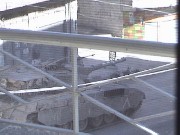 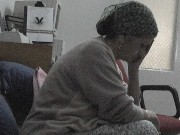 Saturday,
10/5/02: At 5:00 this morning, tanks swarmed the city streets
of Nablus. At 6:00, they began to open fire (audio
- 1 sec.) to get people's attention (it works very well) and to announce
the imposition of strict curfew. No time limit, no details, simply,
"Curfew. It is forbidden to leave your homes. If you do, you
will be shot. Curfew." There was little sleeping to be done
after that point - the bedrooms all face the street (particularly with
the compound wall destroyed), so the family gathered in the common room
to stay safe. Meanwhile, the morning tea boiled over in the kitchen
- that's where the last damage to the home was done, bullets bursting through
the metal window shutters and lodging into the ceiling. Marthame
was supposed to leave today, but there's not even an ambulance to be found
roaming the streets. Instead, the constant grind of tanks.
There's an impending feeling that accompanies their arrival - loudly
squeaking and belching (audio - 5 sec.),
but just out of sight. Then they emerge, the gun turrets moving on their
own, then opening fire (audio - 1 sec.).
Nablus' location between Mount Ebal and Gerizim adds echo to it all, making
it that much more claustrophobic. Saturday,
10/5/02: At 5:00 this morning, tanks swarmed the city streets
of Nablus. At 6:00, they began to open fire (audio
- 1 sec.) to get people's attention (it works very well) and to announce
the imposition of strict curfew. No time limit, no details, simply,
"Curfew. It is forbidden to leave your homes. If you do, you
will be shot. Curfew." There was little sleeping to be done
after that point - the bedrooms all face the street (particularly with
the compound wall destroyed), so the family gathered in the common room
to stay safe. Meanwhile, the morning tea boiled over in the kitchen
- that's where the last damage to the home was done, bullets bursting through
the metal window shutters and lodging into the ceiling. Marthame
was supposed to leave today, but there's not even an ambulance to be found
roaming the streets. Instead, the constant grind of tanks.
There's an impending feeling that accompanies their arrival - loudly
squeaking and belching (audio - 5 sec.),
but just out of sight. Then they emerge, the gun turrets moving on their
own, then opening fire (audio - 1 sec.).
Nablus' location between Mount Ebal and Gerizim adds echo to it all, making
it that much more claustrophobic. 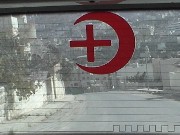 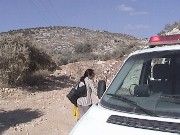 Nobody's
shooting back, but that doesn't seem to matter. Curfew is announced
(as if there was any doubt of going to work or school), and parents warn
their children not to open the doors. Life these days. Eventually,
the tanks moved on from our intersection, allowing the Greek Orthodox priest
Fr. George enough time to come over from his nearby home for a visit and
a little backgammon. He refused to let Marthame film him playing
- somehow not deemed appropriate for a man of the cloth to dally in such
pursuits. But the sound of the dice, his Byzantine prayers, and the
Japanimation cartoon the kids were watching created a stunning montage
(audio - 5 sec.). In Zababdeh, today
is a day off, commemorating Mohammad's night visitation to Jerusalem.
Elizabeth enjoyed an extra day off, using it to catch up on grading and
a host of tasks "on the back burner" since our return to Zababdeh in August.
In the early afternoon, Marthame got a call from St. Luke's Hospital.
The employees from Zababdeh had arranged for an ambulance and were heading
home. They picked up Marthame and headed to the edge of town.
Most people joked uncomfortably as the vehicle passed through the empty
streets - the accountant prayed fervently. The last time, they had
been stopped outside of Nobody's
shooting back, but that doesn't seem to matter. Curfew is announced
(as if there was any doubt of going to work or school), and parents warn
their children not to open the doors. Life these days. Eventually,
the tanks moved on from our intersection, allowing the Greek Orthodox priest
Fr. George enough time to come over from his nearby home for a visit and
a little backgammon. He refused to let Marthame film him playing
- somehow not deemed appropriate for a man of the cloth to dally in such
pursuits. But the sound of the dice, his Byzantine prayers, and the
Japanimation cartoon the kids were watching created a stunning montage
(audio - 5 sec.). In Zababdeh, today
is a day off, commemorating Mohammad's night visitation to Jerusalem.
Elizabeth enjoyed an extra day off, using it to catch up on grading and
a host of tasks "on the back burner" since our return to Zababdeh in August.
In the early afternoon, Marthame got a call from St. Luke's Hospital.
The employees from Zababdeh had arranged for an ambulance and were heading
home. They picked up Marthame and headed to the edge of town.
Most people joked uncomfortably as the vehicle passed through the empty
streets - the accountant prayed fervently. The last time, they had
been stopped outside of 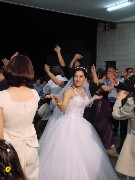 town
and made to turn back, descending a steep mountain into a valley where
they couldn't be spotted. This town
and made to turn back, descending a steep mountain into a valley where
they couldn't be spotted. This 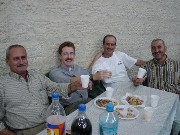 time,
we were more fortunate. We arrived at the bulldozed road to 'Asira
without incident, even at the crossing of the Israeli military road.
Ambulance is the only way to travel on a day like today. Marthame
arrived back in town in time to clean up for a friend's wedding.
As the village descended to the party, the buzz was that Israeli jeeps
just passed through town. Apparently they had stopped on the main
road for a few minutes before moving on - seems hardly worth mentioning
given three days in Nablus (or even three hours in Nablus). We went
home, but could still hear the party raging for several more hours (audio
- 4 sec.). This was the first wedding party held outside since the
second Intifada
started two years ago. As in the first Intifada,
most celebrations are minimal, and held indoors out of respect for the
struggle's dead and mourning. However, at some point, folks also
have the inclination to try to live their lives as normally as they can.
Still, as celebratory as this party seemed to us, it doesn't compare to
pre-Intifada fetes, which could last several days. It's nice
for us to reflect back on our first wedding here two years ago, where everyone
was staring at these strangers in their midst. They're still staring,
but we feel very much at home here. And that's wonderful. Tonight
is Marthame's sister's birthday, so a celebratory phone call (in Arabic
and English) seemed in order. time,
we were more fortunate. We arrived at the bulldozed road to 'Asira
without incident, even at the crossing of the Israeli military road.
Ambulance is the only way to travel on a day like today. Marthame
arrived back in town in time to clean up for a friend's wedding.
As the village descended to the party, the buzz was that Israeli jeeps
just passed through town. Apparently they had stopped on the main
road for a few minutes before moving on - seems hardly worth mentioning
given three days in Nablus (or even three hours in Nablus). We went
home, but could still hear the party raging for several more hours (audio
- 4 sec.). This was the first wedding party held outside since the
second Intifada
started two years ago. As in the first Intifada,
most celebrations are minimal, and held indoors out of respect for the
struggle's dead and mourning. However, at some point, folks also
have the inclination to try to live their lives as normally as they can.
Still, as celebratory as this party seemed to us, it doesn't compare to
pre-Intifada fetes, which could last several days. It's nice
for us to reflect back on our first wedding here two years ago, where everyone
was staring at these strangers in their midst. They're still staring,
but we feel very much at home here. And that's wonderful. Tonight
is Marthame's sister's birthday, so a celebratory phone call (in Arabic
and English) seemed in order. |
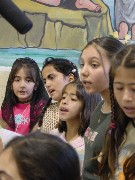 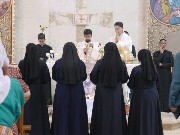 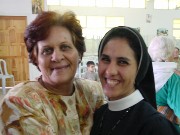 Sunday,
10/6/02: Kul 'am w-intum bi-khayr - every year and with
y'all goodness, the literal translation of this customary greeting at feast
times. Today is the feast of the
Rosary Sisters' order, and the church turned out in full to celebrate.
There are three sisters serving in the village, two of them teaching in
the school, and their ministries are deeply appreciated by the people here
(and by us). Their order has been here almost as long as there has
been a Latin (Roman Catholic) parish. Sister Elba, who is quite gifted
in music, has added to a new sense of hymnody to the worship here - some
of the tunes are quite familiar, even if the words aren't (audio
- 11 sec.). We adjourned to the church hall for coffee, words
of appreciation, and ululating (audio -
15 sec.). What celebration would be complete without ululating?
We went to visit the home of another of our teaching colleagues for some
home-cooked msakhan and a splendid view of the village from the
west. In the evening, several of the local members of the University's
English department came by for a visit. Sunday,
10/6/02: Kul 'am w-intum bi-khayr - every year and with
y'all goodness, the literal translation of this customary greeting at feast
times. Today is the feast of the
Rosary Sisters' order, and the church turned out in full to celebrate.
There are three sisters serving in the village, two of them teaching in
the school, and their ministries are deeply appreciated by the people here
(and by us). Their order has been here almost as long as there has
been a Latin (Roman Catholic) parish. Sister Elba, who is quite gifted
in music, has added to a new sense of hymnody to the worship here - some
of the tunes are quite familiar, even if the words aren't (audio
- 11 sec.). We adjourned to the church hall for coffee, words
of appreciation, and ululating (audio -
15 sec.). What celebration would be complete without ululating?
We went to visit the home of another of our teaching colleagues for some
home-cooked msakhan and a splendid view of the village from the
west. In the evening, several of the local members of the University's
English department came by for a visit. 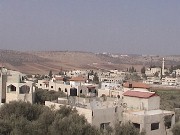 They
are hoping to build more connections with the Latin School in Zababdeh
(as are we), but mostly we talked politics. Just at the most desperate
moments here, there are these incredible voices of reason that come ringing
through. These folks, like most people here, deeply worry about an
impending war in Iraq and its effects on
them. Even so, they remain hopeful that a future generation of Israelis
and Palestinians will be able to seek a just solution to this bloodletting.
We all agreed that, at some point, it needed to begin with repentance,
with everyone admitting their own wrongdoing. It seems the furthest
from everyone's mind these days. They
are hoping to build more connections with the Latin School in Zababdeh
(as are we), but mostly we talked politics. Just at the most desperate
moments here, there are these incredible voices of reason that come ringing
through. These folks, like most people here, deeply worry about an
impending war in Iraq and its effects on
them. Even so, they remain hopeful that a future generation of Israelis
and Palestinians will be able to seek a just solution to this bloodletting.
We all agreed that, at some point, it needed to begin with repentance,
with everyone admitting their own wrongdoing. It seems the furthest
from everyone's mind these days. |
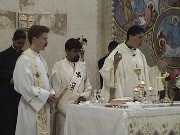 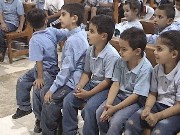 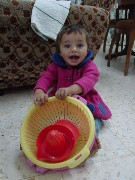 Monday,
10/7/02: Everyone made it to school today. The Tubas
kids, however, are facing a new daily adventure. The Israeli army
has set up what is looking to be a more and more permanent checkpoint between
'Aqaba and Tubas. Every day, the bus has to pass through it - going
and coming. Each time, the soldiers take everyone off the bus, check
the teachers' IDs, and then send them on. At least now they're getting
through. At 12:00, the school adjourned for a special Mass
in honor of yesterday's feast. The Christian students were obliged
to stay - excepting those in Jenin whose
bus left early to get them home hopefully safely. Some were organized
into a small choir, singing, "God is love; Jesus is in my heart; His light
is my way; Alleluia." (audio - 11
sec.) Adorability. The afternoon was filled with the constant
churning sounds of airplanes overhead - no matter how much it might happen,
it's difficult - if not impossible - to get used to it. The sound
isn't deafening, but you can't drown it out. And it's constant.
And it has this sense of dread to it. Reports like the one coming
out of Khan Yunis refugee camp in Gaza this
morning (fourteen Palestinians killed by Israeli airplane fire) no doubt
add to our anxiety. In the evening, our shepherd
friend came over for a visit, bringing his wife with him. The children,
meanwhile, were in the tent taking care of each other, all except for the
youngest daughter whom they brought along with them. She's unaccustomed
to such bright-lit places at night, but our plastic strainers made good
enough toys. Monday,
10/7/02: Everyone made it to school today. The Tubas
kids, however, are facing a new daily adventure. The Israeli army
has set up what is looking to be a more and more permanent checkpoint between
'Aqaba and Tubas. Every day, the bus has to pass through it - going
and coming. Each time, the soldiers take everyone off the bus, check
the teachers' IDs, and then send them on. At least now they're getting
through. At 12:00, the school adjourned for a special Mass
in honor of yesterday's feast. The Christian students were obliged
to stay - excepting those in Jenin whose
bus left early to get them home hopefully safely. Some were organized
into a small choir, singing, "God is love; Jesus is in my heart; His light
is my way; Alleluia." (audio - 11
sec.) Adorability. The afternoon was filled with the constant
churning sounds of airplanes overhead - no matter how much it might happen,
it's difficult - if not impossible - to get used to it. The sound
isn't deafening, but you can't drown it out. And it's constant.
And it has this sense of dread to it. Reports like the one coming
out of Khan Yunis refugee camp in Gaza this
morning (fourteen Palestinians killed by Israeli airplane fire) no doubt
add to our anxiety. In the evening, our shepherd
friend came over for a visit, bringing his wife with him. The children,
meanwhile, were in the tent taking care of each other, all except for the
youngest daughter whom they brought along with them. She's unaccustomed
to such bright-lit places at night, but our plastic strainers made good
enough toys. |
|
Tuesday, 10/8/02: All the kids came to school today. The bus from Tubas was stopped at the new checkpoint, and the soldier, who had questioned everyone yesterday, recognized the bus. He chatted friendily with the kids in Hebrew-accented Arabic, asking how they were and asking if they were going to school in Zababdeh. He then told them to have a nice day and waved them through. When he related the story to us, our Tubasi colleague was elated - not only to be let though without trouble, but also because of the soldier's humanity and friendliness. Moments like this are a strange ray of hope in this place. |
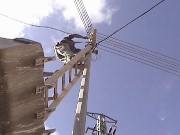 Wednesday,
10/9/02: Marthame took a break from his duties at the school
to film an historical event: the re-introduction of electricity to Wednesday,
10/9/02: Marthame took a break from his duties at the school
to film an historical event: the re-introduction of electricity to 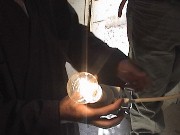 Zababdeh's
Melkite Church. To accomplish this feat, some creative (if not safe)
problem-solving was employed. The metal electrical pole was too high
for a ladder, and too slick to climb. Deacon Firas and the village
electrician called for a front loader, and stood in its bucket until it
was high enough to lean the ladder against the pole - one steadied and
the other climbed and attached the wires. It's the first, albeit
humble, step towards re-opening the church. In sporting news, the
final match had to be cancelled today because of injury - one of the 11th
graders landed on his head, but thankfully escaped with an egg-sized knot.
Getting him to Jenin for an emergency, let
alone an X-Ray, would've been nearly impossible. Marthame spent most
of the afternoon with Fr. Aktham pricing an LCD projector for the school
and strategizing its funding (and its travel/taxation). Who said
that ministry didn't have its variety? Most afternoons, the school
building remains open until 3:00 (1 1/2 hours after school's out) for special
classes for students who failed their tawjihi
exams (the rigorous
comprehensive exams Zababdeh's
Melkite Church. To accomplish this feat, some creative (if not safe)
problem-solving was employed. The metal electrical pole was too high
for a ladder, and too slick to climb. Deacon Firas and the village
electrician called for a front loader, and stood in its bucket until it
was high enough to lean the ladder against the pole - one steadied and
the other climbed and attached the wires. It's the first, albeit
humble, step towards re-opening the church. In sporting news, the
final match had to be cancelled today because of injury - one of the 11th
graders landed on his head, but thankfully escaped with an egg-sized knot.
Getting him to Jenin for an emergency, let
alone an X-Ray, would've been nearly impossible. Marthame spent most
of the afternoon with Fr. Aktham pricing an LCD projector for the school
and strategizing its funding (and its travel/taxation). Who said
that ministry didn't have its variety? Most afternoons, the school
building remains open until 3:00 (1 1/2 hours after school's out) for special
classes for students who failed their tawjihi
exams (the rigorous
comprehensive exams 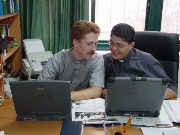 required
for a high school diploma) and want to retake them. Recently Elizabeth
has been taking advantage of the extended hours to get some grading done
without carting notebooks and papers home. Today, by the time she
left the school, several parents in Jenin
had called asking where their kids were. The Jenin buses, which left
the school around 1: 45, had not arrived by 3:00. We eventually got in
touch with some friends who were able to fill us in on the details: they
were made to wait at the entrance of Jenin by the Israeli army - it was
beginning to look like a repeat of last year.
Eventually, they were allowed to enter the city, arriving home at 4:30.
Before the Jenin closures, this trip used to take maybe half an hour, 45
minutes with all its stops. Our Jenin students are facing real sacrifices
and challenges even just to get to school. With news of a schoolgirl killed
by Israeli gunfire in Jenin yesterday (and two female university students
in the hospital for the same reason), it's enough to give one pause.
Rumor has it that the military commander responsible for the Nablus curfew
has been transferred to Jenin to enforce the curfew there. That doesn't
bode well. required
for a high school diploma) and want to retake them. Recently Elizabeth
has been taking advantage of the extended hours to get some grading done
without carting notebooks and papers home. Today, by the time she
left the school, several parents in Jenin
had called asking where their kids were. The Jenin buses, which left
the school around 1: 45, had not arrived by 3:00. We eventually got in
touch with some friends who were able to fill us in on the details: they
were made to wait at the entrance of Jenin by the Israeli army - it was
beginning to look like a repeat of last year.
Eventually, they were allowed to enter the city, arriving home at 4:30.
Before the Jenin closures, this trip used to take maybe half an hour, 45
minutes with all its stops. Our Jenin students are facing real sacrifices
and challenges even just to get to school. With news of a schoolgirl killed
by Israeli gunfire in Jenin yesterday (and two female university students
in the hospital for the same reason), it's enough to give one pause.
Rumor has it that the military commander responsible for the Nablus curfew
has been transferred to Jenin to enforce the curfew there. That doesn't
bode well. |
|
Thursday, 10/10/02: No Jenin students today - no surprise. It has already been a long school year, and it's only October. |
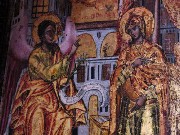 Friday,
10/11/02: We left early this morning with Deacon Firas, hiring
a taxi to go from Zababdeh through the tractor trails to the Green Line.
After forty minutes, we met our next taxi in the village of Jalame, on
the Palestinian side of the border. In addition to the Melkites in Zababdeh,
Deacon Firas will have responsibility for the Christian community (historically
Melkite) in this town. They number about 150, and in good times would travel
to Jenin for worship. Those are days are in the past. His plan
is to rent a house in the village and to prepare a small chapel there in
order to provide a worship space for the community. That is how the
Melkite Church in Zababdeh began more than one hundred years ago.
From Jalame, we Friday,
10/11/02: We left early this morning with Deacon Firas, hiring
a taxi to go from Zababdeh through the tractor trails to the Green Line.
After forty minutes, we met our next taxi in the village of Jalame, on
the Palestinian side of the border. In addition to the Melkites in Zababdeh,
Deacon Firas will have responsibility for the Christian community (historically
Melkite) in this town. They number about 150, and in good times would travel
to Jenin for worship. Those are days are in the past. His plan
is to rent a house in the village and to prepare a small chapel there in
order to provide a worship space for the community. That is how the
Melkite Church in Zababdeh began more than one hundred years ago.
From Jalame, we 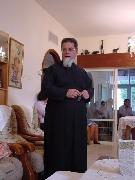 crossed
the border and went to Nazareth (after a brief visit with the soldiers
at the checkpoint, bewildered and bemused by our presence). In Nazareth,
we paid a visit to the Greek Orthodox church of Mary's Well, believed to
be site of the annunciation of Gabriel to Mary (The Roman Catholic Church
holds to the tradition that Gabriel approched Mary at home, and nearby
is their massive Church of the Annuciation). The grotto's walls,
around a gurgling well, date from the time of Constantine, and the rest
of the church from about 250 years ago. Deacon Firas offered Byzantine
prayers at the site (audio - 14 sec.).
Particularly in the absence of the tourists, such chants are hauntingly
moving. At the Greek Catholic Synagogue Church in Nazareth's Old
City (memorializing where Jesus read from the scroll of Isaiah - Luke 4),
we visited with the newly-ordained deacon there before crossed
the border and went to Nazareth (after a brief visit with the soldiers
at the checkpoint, bewildered and bemused by our presence). In Nazareth,
we paid a visit to the Greek Orthodox church of Mary's Well, believed to
be site of the annunciation of Gabriel to Mary (The Roman Catholic Church
holds to the tradition that Gabriel approched Mary at home, and nearby
is their massive Church of the Annuciation). The grotto's walls,
around a gurgling well, date from the time of Constantine, and the rest
of the church from about 250 years ago. Deacon Firas offered Byzantine
prayers at the site (audio - 14 sec.).
Particularly in the absence of the tourists, such chants are hauntingly
moving. At the Greek Catholic Synagogue Church in Nazareth's Old
City (memorializing where Jesus read from the scroll of Isaiah - Luke 4),
we visited with the newly-ordained deacon there before 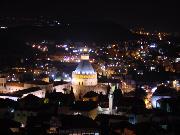 grabbing
the bus to Shefa'amer and finally a taxi to Ibillin and Mar Elias College.
Fr. Elias Chacour, the school's founder, welcomed his unexpected guests
with lunch. The reason for all of this travel was to rendevous with
the delegation of the Presbyterian Church
(USA) traveling with its Moderator Rev. Dr. Fahed Abu-Akel. For
two weeks, they are in the area visiting PCUSA projects and partners and
meeting with various community leaders. This afternoon, Fr. Elias
hosted them and shared his story, his vision, and his challenge for these
American brothers and sisters in Christ who, because of nationality, wield
inordinate global political power. He and Dr. Abu-Akel have a long
friendship, so it was particularly moving to see them together. Work
is continuing on the Mar Elias Department of Divinity, where Marthame expects
to be teaching next semester. The new structure looms over the rest of
the campus, seeming more of a cathedral than a Divinity School. We
arrived back in Nazareth in the evening for dinner at St. Margaret's, an
Anglican hostel with a spectacular view overlooking the city. A long
day for us pilgrims. grabbing
the bus to Shefa'amer and finally a taxi to Ibillin and Mar Elias College.
Fr. Elias Chacour, the school's founder, welcomed his unexpected guests
with lunch. The reason for all of this travel was to rendevous with
the delegation of the Presbyterian Church
(USA) traveling with its Moderator Rev. Dr. Fahed Abu-Akel. For
two weeks, they are in the area visiting PCUSA projects and partners and
meeting with various community leaders. This afternoon, Fr. Elias
hosted them and shared his story, his vision, and his challenge for these
American brothers and sisters in Christ who, because of nationality, wield
inordinate global political power. He and Dr. Abu-Akel have a long
friendship, so it was particularly moving to see them together. Work
is continuing on the Mar Elias Department of Divinity, where Marthame expects
to be teaching next semester. The new structure looms over the rest of
the campus, seeming more of a cathedral than a Divinity School. We
arrived back in Nazareth in the evening for dinner at St. Margaret's, an
Anglican hostel with a spectacular view overlooking the city. A long
day for us pilgrims. |
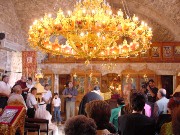 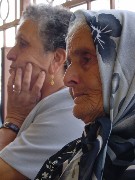 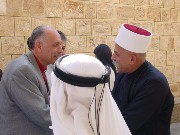 Saturday,
10/12/02: After waking up in Nazareth and a luxurious breakfast,
we had the chance to share the story of our ministry with the Moderator's
delegation. Since they would not be traveling there, we hoped that
at least we could bring Zababdeh to them. It's far more difficult
to convey the situation and our ministry with words than to have people
experience them. Perhaps we'll bring the delegation to Zababdeh the
next time PCUSA elects a Palestinian Christian to be moderator...We drove
through Nazareth and Haifa, stopping briefly at Mary's Well Church (the
second time in as many days for us), and noticing the affects on those
cities due to the situation that Palestinian citizens of Israel face: overcrowding,
little infrastructure or support. Our destination was the village
of Kufr Yasif, Rev. Dr. Abu-Akel's home town. He had been raised
in the Greek Orthodox Church there, and even though he had become a Protestant
pastor, it was that church which hosted his "welcome home" reception.
Following a brief prayer service with elegant liturgy (in both English
- audio - 18 Saturday,
10/12/02: After waking up in Nazareth and a luxurious breakfast,
we had the chance to share the story of our ministry with the Moderator's
delegation. Since they would not be traveling there, we hoped that
at least we could bring Zababdeh to them. It's far more difficult
to convey the situation and our ministry with words than to have people
experience them. Perhaps we'll bring the delegation to Zababdeh the
next time PCUSA elects a Palestinian Christian to be moderator...We drove
through Nazareth and Haifa, stopping briefly at Mary's Well Church (the
second time in as many days for us), and noticing the affects on those
cities due to the situation that Palestinian citizens of Israel face: overcrowding,
little infrastructure or support. Our destination was the village
of Kufr Yasif, Rev. Dr. Abu-Akel's home town. He had been raised
in the Greek Orthodox Church there, and even though he had become a Protestant
pastor, it was that church which hosted his "welcome home" reception.
Following a brief prayer service with elegant liturgy (in both English
- audio - 18 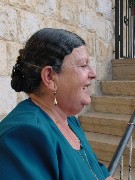 sec.
- and Arabic - audio - 13 sec.), the leaders
of the community were invited to speak in his honor. Fahed spoke
with wonder both of his upbringing in Kufr Yasif with gratitude for those
who nurtured him, and of the process which led him to his current position
as Moderator. His brothers and sisters, as well as many of his 42
nieces and nephews, were all there to celebrate with him - a wonderful
homecoming. After visiting the home where he grew up, where his step-mother
sang his praises for the gathered guests (audio
- 7 sec.), the convoy gathered up and headed down to Jerusalem - the step-mother,
two brothers and five sisters joining in on the "pilgrimage" and enjoying
dinner with us at Notre Dame. What a treat to be a part of a liftetime
experience. sec.
- and Arabic - audio - 13 sec.), the leaders
of the community were invited to speak in his honor. Fahed spoke
with wonder both of his upbringing in Kufr Yasif with gratitude for those
who nurtured him, and of the process which led him to his current position
as Moderator. His brothers and sisters, as well as many of his 42
nieces and nephews, were all there to celebrate with him - a wonderful
homecoming. After visiting the home where he grew up, where his step-mother
sang his praises for the gathered guests (audio
- 7 sec.), the convoy gathered up and headed down to Jerusalem - the step-mother,
two brothers and five sisters joining in on the "pilgrimage" and enjoying
dinner with us at Notre Dame. What a treat to be a part of a liftetime
experience. |
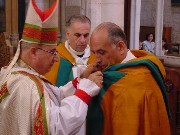 Sunday,
10/13/02: We had not planned to be part of the group this morning,
choosing instead to worship at the altar of Israeli bureacracy and take
care of our visas. We arrived at the Ministry of the Interior to
find a notice posted in Hebrew. Sagur was the only word Marthame
(who has found another valuable use for his seminary Hebrew lessons) could
make out: "closed." As we asked around, we discovered what was the
cause: a strike, the kind Sunday,
10/13/02: We had not planned to be part of the group this morning,
choosing instead to worship at the altar of Israeli bureacracy and take
care of our visas. We arrived at the Ministry of the Interior to
find a notice posted in Hebrew. Sagur was the only word Marthame
(who has found another valuable use for his seminary Hebrew lessons) could
make out: "closed." As we asked around, we discovered what was the
cause: a strike, the kind 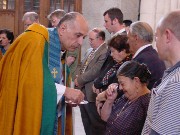 for
which Israeli government workers are famous. Based on our own experiences
and those of others, we sometimes joke that Israeli bureacracy exists to
frustrate the Gentiles. But in this case, Paul was right: there is
neither Jew nor Gentile when it comes to government strikes. But
our cloud of inconvenience had a huge silver lining - we were able to join
the group at St. George's Anglican Cathedral for an historic event.
Every PCUSA moderator has the ex-officio honor of being ecumenical canon
at St. George's, but until now only one moderator had come to Jerusalem
to receive this honor. Rev. Dr. Canon Fahed Abu-Akel is the second,
and today this honor was given to him as part of the Sunday worship service.
The liturgy was done in Arabic and English and sounded at times like how
Pentecost must have sounded, but the for
which Israeli government workers are famous. Based on our own experiences
and those of others, we sometimes joke that Israeli bureacracy exists to
frustrate the Gentiles. But in this case, Paul was right: there is
neither Jew nor Gentile when it comes to government strikes. But
our cloud of inconvenience had a huge silver lining - we were able to join
the group at St. George's Anglican Cathedral for an historic event.
Every PCUSA moderator has the ex-officio honor of being ecumenical canon
at St. George's, but until now only one moderator had come to Jerusalem
to receive this honor. Rev. Dr. Canon Fahed Abu-Akel is the second,
and today this honor was given to him as part of the Sunday worship service.
The liturgy was done in Arabic and English and sounded at times like how
Pentecost must have sounded, but the 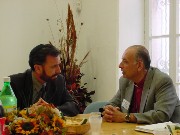 hymns
were wonderful - familiar tunes to both communities, the same tune with
different lyrics. After worship, we gathered with a group of young
adults who are staying at the nearby YMCA and participating in a program
studying conflict resolution. We all met with Bishop Riah Abu-Assal and
heard his challenge to the Western church. He is particularly concerned
about the growing popularity of the notion of transfer, as evidenced by
signs in Hebrew all over the country declaring, "Jordan is the Palestinian
state." He warns that the Middle Eastern Church is enduring serious
consequences of the Western church's action (and inaction) regarding the
Palestinian situation. A dominant image of Western Christians here is that
of the hundreds who come every year (even the past two) explicitly to show
their support for the nation of Israel. They come largely with the hopes
that the presence of a stong Jewish state will hasten the second coming
of Christ and fulfill a very particular eschatological understanding, in
which the Jews are finally converted or sent to hell. Never mind that -
until then, Israel opens its arms wide to such a powerful political support
in the US. Meanwhile, the Christians here wonder who is in support of them.
Where are the hundreds of Christians making pilgrimage to show them encouragement?
And they fret over the message sent to their Muslim neighbors, that being
Christian means pro-Israeli. And their Muslim neighbors feel affirmed in
their growing sense that they have been successfully villified in the West. hymns
were wonderful - familiar tunes to both communities, the same tune with
different lyrics. After worship, we gathered with a group of young
adults who are staying at the nearby YMCA and participating in a program
studying conflict resolution. We all met with Bishop Riah Abu-Assal and
heard his challenge to the Western church. He is particularly concerned
about the growing popularity of the notion of transfer, as evidenced by
signs in Hebrew all over the country declaring, "Jordan is the Palestinian
state." He warns that the Middle Eastern Church is enduring serious
consequences of the Western church's action (and inaction) regarding the
Palestinian situation. A dominant image of Western Christians here is that
of the hundreds who come every year (even the past two) explicitly to show
their support for the nation of Israel. They come largely with the hopes
that the presence of a stong Jewish state will hasten the second coming
of Christ and fulfill a very particular eschatological understanding, in
which the Jews are finally converted or sent to hell. Never mind that -
until then, Israel opens its arms wide to such a powerful political support
in the US. Meanwhile, the Christians here wonder who is in support of them.
Where are the hundreds of Christians making pilgrimage to show them encouragement?
And they fret over the message sent to their Muslim neighbors, that being
Christian means pro-Israeli. And their Muslim neighbors feel affirmed in
their growing sense that they have been successfully villified in the West. 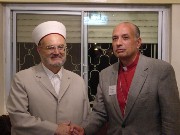 Mindful of her classes tomorrow, Elizabeth parted with the group and from
Qalandia caught a taxi towards Zababdeh. She had an interesting conversation
with the other riders about what she is doing in Palestine. The young men
in the taxi wanted to tell her in the strongest way that Palestinians do
not hate Americans. "We love the American people!" he said. "It's the government
policy we hate" (Something both of us have been told innumberable times).
We discussed 9/11, and one man said he'd given blood for the rescue effort,
when we all thought the tragedy would require massive amounts of blood.
Indeed there was a 9/11 blood drive in Palestine, an odd seeming thing
considering how much Palestinian blood is already being shed at home. Elizabeth
brought up the news footage of Palestinians celebrating after the attacks.
He and the others in the taxi asserted that these people were paid to do
this by the Israeli government: "They take simpletons and offer them money
for this!" Conspiracy theories abound; the challenge is discerning when
they are (as happens here) correct. Not convinced that this was one of
those times, Elizabeth could agree with the other passengers that it was
a real shame that the candle-lit flower-strewn vigils, the blood drive,
the general dismay among Palestinians didn't make the same heavy rotation
on the Western news. The young men urgently wanted Elizabeth to share with
her friends and family in America that Palestinians don't hate them. So,
there you are, yaa shab. Meanwhile, the Marthame and the Moderator's
group went over to West Jerusalem to meet with Rabbi Cohen, the director
of the American Jewish Committee. Born in Britain, he is an Orthodox rabbi
and has worked in leadership positions in Ireland and South Africa.
He presented himself as a faithful, progressive Jew, willing to work in
cooperation with Palestinians, and no doubt that's the case - the question
remains under what stipulations. When asked about the suffocating
siege in
Mindful of her classes tomorrow, Elizabeth parted with the group and from
Qalandia caught a taxi towards Zababdeh. She had an interesting conversation
with the other riders about what she is doing in Palestine. The young men
in the taxi wanted to tell her in the strongest way that Palestinians do
not hate Americans. "We love the American people!" he said. "It's the government
policy we hate" (Something both of us have been told innumberable times).
We discussed 9/11, and one man said he'd given blood for the rescue effort,
when we all thought the tragedy would require massive amounts of blood.
Indeed there was a 9/11 blood drive in Palestine, an odd seeming thing
considering how much Palestinian blood is already being shed at home. Elizabeth
brought up the news footage of Palestinians celebrating after the attacks.
He and the others in the taxi asserted that these people were paid to do
this by the Israeli government: "They take simpletons and offer them money
for this!" Conspiracy theories abound; the challenge is discerning when
they are (as happens here) correct. Not convinced that this was one of
those times, Elizabeth could agree with the other passengers that it was
a real shame that the candle-lit flower-strewn vigils, the blood drive,
the general dismay among Palestinians didn't make the same heavy rotation
on the Western news. The young men urgently wanted Elizabeth to share with
her friends and family in America that Palestinians don't hate them. So,
there you are, yaa shab. Meanwhile, the Marthame and the Moderator's
group went over to West Jerusalem to meet with Rabbi Cohen, the director
of the American Jewish Committee. Born in Britain, he is an Orthodox rabbi
and has worked in leadership positions in Ireland and South Africa.
He presented himself as a faithful, progressive Jew, willing to work in
cooperation with Palestinians, and no doubt that's the case - the question
remains under what stipulations. When asked about the suffocating
siege in 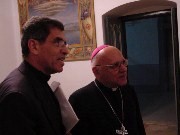 Nablus,
he replied that faithful Jews should feel awful about it, but suicide bombings
leave the government with no other recourse - utility before ethics.
If this is the progressive Israeli politics, de-escalation doesn't seem
likely. Our next visit in the interesting headwear department (with
bishops, rabbis, and muftis we've got quite a collection!) was the Mufti
of Jerusalem, Akram Sabri, whom we met in his home not far from Qalandia.
His major concern was the recent US congressional act which, at least on
paper, recognizes Jerusalem as the capital of Israel, making the USA one
of perhaps 3 countries in the world that do so. The Mufti considered us
important ambassadors to bring back the message that this move is provocative
and unjust both morally and according to international law. Finally,
to round out our interfaith-ecumenical meetings, we met with Latin Patriarch
Michel Sabbah. We have come to respect him deeply in our time here,
both for his spiritual depth and candor and for his pastoral care of his
congregations and parishioners. He is a quiet man, and soft-spoken,
and even more so now - it seems that the situation has worn on him over
the last two years. He eloquently stated that the Palestinian Christians
have a particular calling, and that is to be custodians of the faith in
the land of its birth. He is asking them not to abandon this call,
but to embrace it - with all of the difficulty that might mean. Elizabeth
arrived safely in Zababdeh and proceeded to grade some papers in preparation
for tomorrow. Nablus,
he replied that faithful Jews should feel awful about it, but suicide bombings
leave the government with no other recourse - utility before ethics.
If this is the progressive Israeli politics, de-escalation doesn't seem
likely. Our next visit in the interesting headwear department (with
bishops, rabbis, and muftis we've got quite a collection!) was the Mufti
of Jerusalem, Akram Sabri, whom we met in his home not far from Qalandia.
His major concern was the recent US congressional act which, at least on
paper, recognizes Jerusalem as the capital of Israel, making the USA one
of perhaps 3 countries in the world that do so. The Mufti considered us
important ambassadors to bring back the message that this move is provocative
and unjust both morally and according to international law. Finally,
to round out our interfaith-ecumenical meetings, we met with Latin Patriarch
Michel Sabbah. We have come to respect him deeply in our time here,
both for his spiritual depth and candor and for his pastoral care of his
congregations and parishioners. He is a quiet man, and soft-spoken,
and even more so now - it seems that the situation has worn on him over
the last two years. He eloquently stated that the Palestinian Christians
have a particular calling, and that is to be custodians of the faith in
the land of its birth. He is asking them not to abandon this call,
but to embrace it - with all of the difficulty that might mean. Elizabeth
arrived safely in Zababdeh and proceeded to grade some papers in preparation
for tomorrow. |
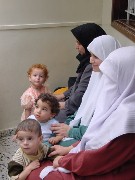 Monday,
10/14/02: Monday,
10/14/02: 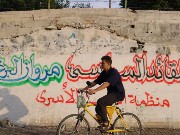 The
group arose early and went to Gaza. Along the way, we passed the
remains of Arab West Jerusalem, now scrubbed clean of its Palestinian heritage.
A few old buildings stand, and terraces of Palestinian olive plantations
remain, but the trees have been uprooted and replaced with evergreens,
giving the impression that it is all new development. The signs Bishop
Riah mentioned yesterday line the highways all the way down to the Erez
crossing into the Gaza Strip. Disturbing times...Before entering
the Israeli checkpoint area, we noticed the turnoff for all Gaza settlements
- a separate entrance, a separate system, a separate reality. It
was the first time either of us have been there in a year
and a half. The checkpoint remains as vacant and as daunting
as ever, looking like an international border crossing but dealing with
only a trickle of traffic passing through. Once through to the Palestinian
side, we were met by representatives from the
Middle
East Council of Churches. Loading us into two vans, they escorted
us around the northern edge of the Strip to see various projects in which
they participate. The first was a free ob/gyn clinic, where we learned
some of the realities of the medical situation these days - escalating
anemia, malnutrition, pregnancy-related complications - all at much higher
levels than they were two years ago. From the doctor who runs the clinic,
we The
group arose early and went to Gaza. Along the way, we passed the
remains of Arab West Jerusalem, now scrubbed clean of its Palestinian heritage.
A few old buildings stand, and terraces of Palestinian olive plantations
remain, but the trees have been uprooted and replaced with evergreens,
giving the impression that it is all new development. The signs Bishop
Riah mentioned yesterday line the highways all the way down to the Erez
crossing into the Gaza Strip. Disturbing times...Before entering
the Israeli checkpoint area, we noticed the turnoff for all Gaza settlements
- a separate entrance, a separate system, a separate reality. It
was the first time either of us have been there in a year
and a half. The checkpoint remains as vacant and as daunting
as ever, looking like an international border crossing but dealing with
only a trickle of traffic passing through. Once through to the Palestinian
side, we were met by representatives from the
Middle
East Council of Churches. Loading us into two vans, they escorted
us around the northern edge of the Strip to see various projects in which
they participate. The first was a free ob/gyn clinic, where we learned
some of the realities of the medical situation these days - escalating
anemia, malnutrition, pregnancy-related complications - all at much higher
levels than they were two years ago. From the doctor who runs the clinic,
we 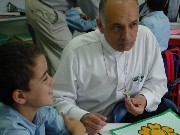 learned
why we were not heading south at all - his half-hour commute south has
turned into a 2-3 hour one, even taking as long as three days at one point
because of the single checkpoint that lies beyond. Before he moved
to Gaza City, he had on several occasions slept in his car on his marathon
trip to work. We experienced some of learned
why we were not heading south at all - his half-hour commute south has
turned into a 2-3 hour one, even taking as long as three days at one point
because of the single checkpoint that lies beyond. Before he moved
to Gaza City, he had on several occasions slept in his car on his marathon
trip to work. We experienced some of 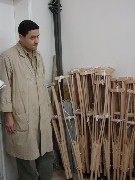 that
micro-division of the Gaza Strip the last time we were here. It was mind-blowing
that a place where everything is so close together could be made into a
place where everything is so inaccessible. The next stop was a vocational
training center for the young men of the city. They are taught carpentry
skills, learning to make furniture which they take home or which is sold
to raise funds for the school. The Atfaluna
Society for Deaf Children was next, which provides special education
for as many of Gaza's hearing impaired children and adults as it possibly
can - school classrooms, workshops, handicraft centers make up this wonderful
sign of hope. In one of the classrooms, Fahed stopped to "chat" with the
students. One of them was curious about the big silver cross hanging
around his neck. He explained, through a sign-language interpreter,
what it means in terms of his role in the church, what this large group
of foreigners was doing in this place, and what message they were taking
with them from this place. The child seemed satisfied in his curiosity.
Our final stop before that
micro-division of the Gaza Strip the last time we were here. It was mind-blowing
that a place where everything is so close together could be made into a
place where everything is so inaccessible. The next stop was a vocational
training center for the young men of the city. They are taught carpentry
skills, learning to make furniture which they take home or which is sold
to raise funds for the school. The Atfaluna
Society for Deaf Children was next, which provides special education
for as many of Gaza's hearing impaired children and adults as it possibly
can - school classrooms, workshops, handicraft centers make up this wonderful
sign of hope. In one of the classrooms, Fahed stopped to "chat" with the
students. One of them was curious about the big silver cross hanging
around his neck. He explained, through a sign-language interpreter,
what it means in terms of his role in the church, what this large group
of foreigners was doing in this place, and what message they were taking
with them from this place. The child seemed satisfied in his curiosity.
Our final stop before 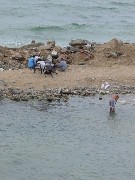 lunch
was to meet with Dr. Haider Abdul-Shafi, president of the Palestinian Red
Crescent Society, the man who had led the Palestinian delegation to the
Madrid negotiations. Though he is well-on in years, he has a sharp
mind and a clear critique - not only of the Israeli Occupation, but of
the Palestinians' failure to effectively communicate their story to the
rest of the world. We gathered with the local board of the Near East
Council of Churches for lunch in a restaurant along the sea. Fresh,
fresh fish was the order of the day, and we chatted with a remarkable cross-section
of the Gazan Christian community. They now number about 3000 in a
total population of 1.3 million, and they have been dealing with the nightly
bombardments that everyone else has had to cope with. Most are Greek Orthodox,
though there are small lunch
was to meet with Dr. Haider Abdul-Shafi, president of the Palestinian Red
Crescent Society, the man who had led the Palestinian delegation to the
Madrid negotiations. Though he is well-on in years, he has a sharp
mind and a clear critique - not only of the Israeli Occupation, but of
the Palestinians' failure to effectively communicate their story to the
rest of the world. We gathered with the local board of the Near East
Council of Churches for lunch in a restaurant along the sea. Fresh,
fresh fish was the order of the day, and we chatted with a remarkable cross-section
of the Gazan Christian community. They now number about 3000 in a
total population of 1.3 million, and they have been dealing with the nightly
bombardments that everyone else has had to cope with. Most are Greek Orthodox,
though there are small 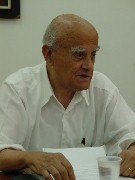 Latin,
Melkite, and Baptist communities here as well. The Anglican church
stands on the grounds of the hospital we visited next, but there is no
priest to serve it. After sharing some messages of solidarity and
prayers of perseverance, we drove through Jabalia refugee camp. The
place, home to former residents of what is now suburban Tel Aviv, is a
contradiction of cramped and sprawling. The streets are not paved,
but covered with reddish sand. The UN schools are so overcrowded
that they run in a pattern of two shifts a day. Usually, groups take
an opportunity to stop and take photos (or at least visit), but our guide
suggested that it wasn't wise. There is no order here, there is no
Authority, and people have been living in more squalor than usual for the
past two years. Every night, Apaches and F-16s fly overhead, and
periodically puncture the night and Gazan buildings with rockets.
If this is hell, then we are the devil's minions, we American taxpayers.
We did manage to find a relatively isolated spot and stopped long Latin,
Melkite, and Baptist communities here as well. The Anglican church
stands on the grounds of the hospital we visited next, but there is no
priest to serve it. After sharing some messages of solidarity and
prayers of perseverance, we drove through Jabalia refugee camp. The
place, home to former residents of what is now suburban Tel Aviv, is a
contradiction of cramped and sprawling. The streets are not paved,
but covered with reddish sand. The UN schools are so overcrowded
that they run in a pattern of two shifts a day. Usually, groups take
an opportunity to stop and take photos (or at least visit), but our guide
suggested that it wasn't wise. There is no order here, there is no
Authority, and people have been living in more squalor than usual for the
past two years. Every night, Apaches and F-16s fly overhead, and
periodically puncture the night and Gazan buildings with rockets.
If this is hell, then we are the devil's minions, we American taxpayers.
We did manage to find a relatively isolated spot and stopped long 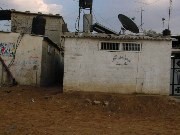 enough
for Fahed to chat with three older men. Crowds of children and shabab
gathered as though they rained from the sky, and some members of the group
got jumpy. We soon left, but not before Fahed was able to draw out
one man's opinion about the solution: 1967 borders. And this from
one who would bear the greatest sacrifice of that solution: of giving up
his homeland. As we left the Gaza Strip, passing through the Israeli
checkpoint, we could hear Palestinian workers heading home from their day-labor
in Israel. A hopeful sign, even if these men represent a small fraction
of the pre-Intifada crowds of employed workers. As they walked
their long, windowless tunnel, they laughed and joked - no doubt to release
the tensions of daily life. We did the same as we rode back towards
Jerusalem. Lutheran Bishop Munib Younan joined us for dinner and
conversation - as we talked about the struggles they are facing, including
the new demolition orders on the Greek
Orthodox housing complex in Beit Sahour (to make way for a new road for
settlers), he received a phone call. Another assassination had taken
place in the Bethlehem area, a man tracked by cellphone. Time for
him to head home while he still could. enough
for Fahed to chat with three older men. Crowds of children and shabab
gathered as though they rained from the sky, and some members of the group
got jumpy. We soon left, but not before Fahed was able to draw out
one man's opinion about the solution: 1967 borders. And this from
one who would bear the greatest sacrifice of that solution: of giving up
his homeland. As we left the Gaza Strip, passing through the Israeli
checkpoint, we could hear Palestinian workers heading home from their day-labor
in Israel. A hopeful sign, even if these men represent a small fraction
of the pre-Intifada crowds of employed workers. As they walked
their long, windowless tunnel, they laughed and joked - no doubt to release
the tensions of daily life. We did the same as we rode back towards
Jerusalem. Lutheran Bishop Munib Younan joined us for dinner and
conversation - as we talked about the struggles they are facing, including
the new demolition orders on the Greek
Orthodox housing complex in Beit Sahour (to make way for a new road for
settlers), he received a phone call. Another assassination had taken
place in the Bethlehem area, a man tracked by cellphone. Time for
him to head home while he still could. |
|
Tuesday, 10/15/02: Long before the group arrived at Tel Aviv, the organizers of the tour and visit had contacted both the Israeli government and the 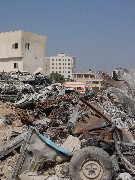 Palestinian
Authority to set up meetings. Despite repeated requests, the Israeli
government never responded (despite the fact that Rev. Dr. Canon Fahed
Abu-Akel is an Israeli citizen). The Authority, on the other hand,
set up a meeting with Yasser Arafat. And so off we went to the muqat'a,
the presidential compound. The Israeli troops had recently pulled
back, but their mark had been left. Palestinian
Authority to set up meetings. Despite repeated requests, the Israeli
government never responded (despite the fact that Rev. Dr. Canon Fahed
Abu-Akel is an Israeli citizen). The Authority, on the other hand,
set up a meeting with Yasser Arafat. And so off we went to the muqat'a,
the presidential compound. The Israeli troops had recently pulled
back, but their mark had been left. 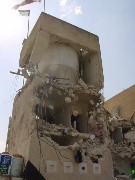 The
place is a moonscape, bordered by barbed wire. Hundreds of employee
and security vehicles are piled up into what looks like a junkyard (video
- 14 sec.). The building where Arafat is spending all of his time
now is piled high with sandbags, a narrow slit ready to welcome visitors.
We were welcomed to bring our cameras in, but cellphones had to be turned
off - possibly related to last night's events. For forty-five minutes,
we met with a man who over many decades has become a legend - both despised
and beloved. Most of the time was dedicated to his reciting of Israeli
affronts to Christian institutions and property in the last two years:
the siege at the Church of the Nativity, the pockmarking of the Virgin
Mary statue, the dynamiting of St. Barbara's Church in Aboud...Sometimes
we need to be reminded of these things. The windowless conference
room where he received us is also now his bedroom and dining room.
He looks old, sick, and tired. And it was clear from our conversation
that he has no vision of a future for his people. No matter one's
opinion of the man, such a lifestyle can't be positive - psychologically,
spiritually, physically, mentally. As we met with him, one of his advisors
came in: a car bomb in Northern Israel. He was clearly exasperated,
directing his anger at Hamas in particular. "I will pay the price
for this. You will see." We left just as another group was
coming to be received - it seems to be what he spends most of his time
doing these days - and, realistically, there's very little else he can
do. We had planned to leave from there, The
place is a moonscape, bordered by barbed wire. Hundreds of employee
and security vehicles are piled up into what looks like a junkyard (video
- 14 sec.). The building where Arafat is spending all of his time
now is piled high with sandbags, a narrow slit ready to welcome visitors.
We were welcomed to bring our cameras in, but cellphones had to be turned
off - possibly related to last night's events. For forty-five minutes,
we met with a man who over many decades has become a legend - both despised
and beloved. Most of the time was dedicated to his reciting of Israeli
affronts to Christian institutions and property in the last two years:
the siege at the Church of the Nativity, the pockmarking of the Virgin
Mary statue, the dynamiting of St. Barbara's Church in Aboud...Sometimes
we need to be reminded of these things. The windowless conference
room where he received us is also now his bedroom and dining room.
He looks old, sick, and tired. And it was clear from our conversation
that he has no vision of a future for his people. No matter one's
opinion of the man, such a lifestyle can't be positive - psychologically,
spiritually, physically, mentally. As we met with him, one of his advisors
came in: a car bomb in Northern Israel. He was clearly exasperated,
directing his anger at Hamas in particular. "I will pay the price
for this. You will see." We left just as another group was
coming to be received - it seems to be what he spends most of his time
doing these days - and, realistically, there's very little else he can
do. We had planned to leave from there, 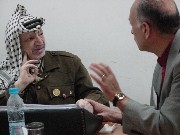 but
called on Dr. Mustafa Barghouti at the Union of Palestinian Medical Relief
Committees. but
called on Dr. Mustafa Barghouti at the Union of Palestinian Medical Relief
Committees. 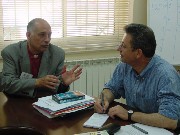 In
contrast to almost everyone else we met, he had a clear understanding,
explanation, and hope for a way out of the situation. With the mind
of a doctor looking at the symptoms, he could advise a cure. And,
in something that is so refreshing here, he isn't afraid to tell the truth.
He spoke about the frustrations they face (for example, two clinics, in
neighboring villages across a settler by-pass road, are now five hours
apart) as well as his energy's focus now, the growing non-violent resistance
movement to protest the Occupation and show solidarity with besieged Palestinian
civilians. Barghouti described how Israeli and Palestinian activists have
been joined by several groups of internationals in non-violent protests.
And when he noted that these non-violent actions often prompt a violent
response from the military or police, he spoke as more than an eye-witness,
having taken a beating, too. Marthame left the group and went to Qalandia
to find a taxi bound toward Jenin, first waiting in line for the slow process
of clearing Israeli security person by person. Withouth proper permissions,
Palestinians are turned back, even though Qalandia is now the main travel
center for the West Bank. If you want to travel to Jenin from Ramallah,
you have to pass through Qalandia. But if you don't have Jerusalem
permission papers, you cannot get out of Ramallah. Fortunately, the
American passport still carries weight. The taxi filled quickly and
the journey began. Bypassing the bypass roads, the taxi was stopped
by an Israeli jeep. We waited in the sun for half an hour while some
IDs were randomly checked and the bags in the trunk were glanced at.
While waiting, someone in the back seat told a joke. Marthame smiled
at the wrong moment, when the Russian policeman was looking at him.
He came over and asked in Hebrew, "What are you laughing at?" Then
in Arabic, "Are you a Muslim?" A cursory passport look and a few
more failed attempts at communicting in Hebrew were all that was required.
Two checkpoints later, Marthame arrived home - word had already gotten
around the village about the meeting this morning. Word travels very
fast here. In
contrast to almost everyone else we met, he had a clear understanding,
explanation, and hope for a way out of the situation. With the mind
of a doctor looking at the symptoms, he could advise a cure. And,
in something that is so refreshing here, he isn't afraid to tell the truth.
He spoke about the frustrations they face (for example, two clinics, in
neighboring villages across a settler by-pass road, are now five hours
apart) as well as his energy's focus now, the growing non-violent resistance
movement to protest the Occupation and show solidarity with besieged Palestinian
civilians. Barghouti described how Israeli and Palestinian activists have
been joined by several groups of internationals in non-violent protests.
And when he noted that these non-violent actions often prompt a violent
response from the military or police, he spoke as more than an eye-witness,
having taken a beating, too. Marthame left the group and went to Qalandia
to find a taxi bound toward Jenin, first waiting in line for the slow process
of clearing Israeli security person by person. Withouth proper permissions,
Palestinians are turned back, even though Qalandia is now the main travel
center for the West Bank. If you want to travel to Jenin from Ramallah,
you have to pass through Qalandia. But if you don't have Jerusalem
permission papers, you cannot get out of Ramallah. Fortunately, the
American passport still carries weight. The taxi filled quickly and
the journey began. Bypassing the bypass roads, the taxi was stopped
by an Israeli jeep. We waited in the sun for half an hour while some
IDs were randomly checked and the bags in the trunk were glanced at.
While waiting, someone in the back seat told a joke. Marthame smiled
at the wrong moment, when the Russian policeman was looking at him.
He came over and asked in Hebrew, "What are you laughing at?" Then
in Arabic, "Are you a Muslim?" A cursory passport look and a few
more failed attempts at communicting in Hebrew were all that was required.
Two checkpoints later, Marthame arrived home - word had already gotten
around the village about the meeting this morning. Word travels very
fast here. |
|
Wednesday, 10/16/02: After some extended absences, the Jenin students were able to arrive today. Fr. Aktham had worked out details directly with the Israeli military authorities, and the bus passed from the main road by way of the tanks to school. Everyone was a buzz with Marthame's high-level delegation travels. In the evening, he stopped by to visit with a friend who has been working in Nazareth for five years. His travel permission had expired a few days before, and he is not going to risk traveling without it. His employer has now accused him of not wanting to come to work. He has begun to look to opportunities to travel and work abroad - sometimes a land across an ocean is closer than the nearest village. The drain on this land, and particularly on this church, is life-threatening. |
|
Thursday, 10/17/02: Marthame spent the evening with Deacon Firas at his brother's internet cafe. Firas is new to the internet, and though he has email, he has not yet learned how to compose, use an address book, or a search engine. He's in the process of rebuilding his church. Unfortunately, given the situation at hand, churches here are rarely self-supporting. Those in the Galilee are in a better position, and he has built relationships with them, but the results of those are still in process. His bishop has encouraged him to look internationally and build connections there in order to do so. A simple yahoo search yielded 8000 results for the word "Melkite", something that sent his mind reeling. |
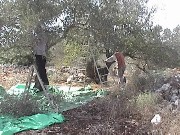 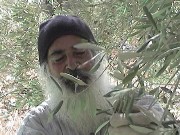 Friday,
10/18/02: While we were gone last weekend, we missed the school's
three-day olive harvest weekend that comes once a year. However, people
harvest their olives all month, and into November, so all was not lost.
Plus, many people didn't go to the olives last weekend because it was extremely
hot. Usually families go out together, and make something of a working
picnic out of it, but last weekend was no picnic weather. Unfortunately,
Elizabeth wouldn't be able to join olive picking today either, as she slept
in to nurse a cold. However, Marthame went out with Fr. Thomas and his
family for the harvest. Since last year's crop was so poor, it was
the first time either of us had been in
two
years. Those members of Zababdeh families who are not in school
or are not working wage-jobs spend the better part of a month collecting
the precious fruit. The rest join them before and after and on days
off. Friday morning, as Fr. Thomas was leading prayers in Tubas,
the rest of his family went out to their land to harvest the forty-three
trees that are their share of family land. They are also building
a house on the land which they hope to inhabit sometime next year.
There is a Friday,
10/18/02: While we were gone last weekend, we missed the school's
three-day olive harvest weekend that comes once a year. However, people
harvest their olives all month, and into November, so all was not lost.
Plus, many people didn't go to the olives last weekend because it was extremely
hot. Usually families go out together, and make something of a working
picnic out of it, but last weekend was no picnic weather. Unfortunately,
Elizabeth wouldn't be able to join olive picking today either, as she slept
in to nurse a cold. However, Marthame went out with Fr. Thomas and his
family for the harvest. Since last year's crop was so poor, it was
the first time either of us had been in
two
years. Those members of Zababdeh families who are not in school
or are not working wage-jobs spend the better part of a month collecting
the precious fruit. The rest join them before and after and on days
off. Friday morning, as Fr. Thomas was leading prayers in Tubas,
the rest of his family went out to their land to harvest the forty-three
trees that are their share of family land. They are also building
a house on the land which they hope to inhabit sometime next year.
There is a 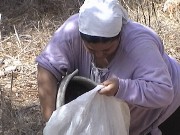 certain
rhythm to picking - one tree, then morning coffee, then another, then breakfast,
then another, tea, then another, and lunch. Tanks had come to the
edge of Zababdeh last night, and as we picked, we could hear them grinding
away up the hill. The situation is never far away, as if the constant
sound of news on the radio wasn't enough of a reminder (audio
- 5 sec.). Other villages have had to deal with harrassment of Israeli
settlers - or outright olive theft - as they try to harvest. The
situation in one village got so bad with nightly masked raids and beatings
that they picked up and moved to other villages. It makes one thankful
to be here. In the early afternoon, Fr. Thomas joined us. He
changed from his priestly garments to that of a farmer, and joined in with
the rest, climbing the trees like a mountain goat and chanting hymns (audio
- 26 sec.). As if to provide counterpoint, the news gave way to Britney
Spears briefly (soundtrack - 4 sec.).
The outside world comes strutting into this Palestinian paradise. certain
rhythm to picking - one tree, then morning coffee, then another, then breakfast,
then another, tea, then another, and lunch. Tanks had come to the
edge of Zababdeh last night, and as we picked, we could hear them grinding
away up the hill. The situation is never far away, as if the constant
sound of news on the radio wasn't enough of a reminder (audio
- 5 sec.). Other villages have had to deal with harrassment of Israeli
settlers - or outright olive theft - as they try to harvest. The
situation in one village got so bad with nightly masked raids and beatings
that they picked up and moved to other villages. It makes one thankful
to be here. In the early afternoon, Fr. Thomas joined us. He
changed from his priestly garments to that of a farmer, and joined in with
the rest, climbing the trees like a mountain goat and chanting hymns (audio
- 26 sec.). As if to provide counterpoint, the news gave way to Britney
Spears briefly (soundtrack - 4 sec.).
The outside world comes strutting into this Palestinian paradise. |
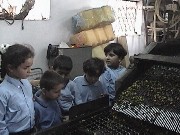 Saturday,
10/19/02: Now it's both of us who are nursing colds. Elizabeth
called in sick at school and stayed in bed as much as possible, between
cups of tea and broth. Marthame left home briefly to forage for important
supplies - tissues, Saturday,
10/19/02: Now it's both of us who are nursing colds. Elizabeth
called in sick at school and stayed in bed as much as possible, between
cups of tea and broth. Marthame left home briefly to forage for important
supplies - tissues, 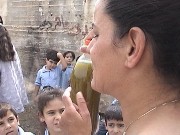 juice,
and bread - and also to accompany the nursery students on their field trip
to the olive press. We had visited several of them two
years ago, but this was the first time either of us has been to one
here in town. The olives are brought in large bags, then dumped into
the system which sorts the olives out from the sticks and leaves, then
they are washed, crushed, then the water and oil are separated out.
The end result is glorious, glorious fresh olive oil. As in previous
years, chances are that people will generously give us some of their oil
and olives - something we're unlikely to turn down. The olive waste,
meantime, is dumped into tractors outside which are the responsibility
of those who bring the olives to deal with. Most simply dump it along
the side of the road, which has damaging effects on the land and watershed.
Some people use the "olive cake" as fuel, as we've seen at the local bakery.
As yet, there is no infrastructure or system to deal properly with olive
cake, or with solid waste generally here. In homes, trash is collected
and taken out carefully tied up in plastic bags (which are ubiquitous)
and deposited in neat dumpsters. Then a truck picks up the trash and it
gets added to a big pile outside of town, often in a ravine or stream bed.
The piles then occasionally get burned. No lining for these makeshift landfills,
no way to control contents of what will be released into the waterways
and land. It wouldn't be so bad if modern consumer goods and materials
weren't here. But as it is, plastics and batteries and aerosol cans are
treated as if they can be disposed of like cucumber peels and cow dung.
These problems have solutions, and when a Palestinian state seemed to be
on the horizon, they could be imagined. But now greater threats occupy
people's minds. juice,
and bread - and also to accompany the nursery students on their field trip
to the olive press. We had visited several of them two
years ago, but this was the first time either of us has been to one
here in town. The olives are brought in large bags, then dumped into
the system which sorts the olives out from the sticks and leaves, then
they are washed, crushed, then the water and oil are separated out.
The end result is glorious, glorious fresh olive oil. As in previous
years, chances are that people will generously give us some of their oil
and olives - something we're unlikely to turn down. The olive waste,
meantime, is dumped into tractors outside which are the responsibility
of those who bring the olives to deal with. Most simply dump it along
the side of the road, which has damaging effects on the land and watershed.
Some people use the "olive cake" as fuel, as we've seen at the local bakery.
As yet, there is no infrastructure or system to deal properly with olive
cake, or with solid waste generally here. In homes, trash is collected
and taken out carefully tied up in plastic bags (which are ubiquitous)
and deposited in neat dumpsters. Then a truck picks up the trash and it
gets added to a big pile outside of town, often in a ravine or stream bed.
The piles then occasionally get burned. No lining for these makeshift landfills,
no way to control contents of what will be released into the waterways
and land. It wouldn't be so bad if modern consumer goods and materials
weren't here. But as it is, plastics and batteries and aerosol cans are
treated as if they can be disposed of like cucumber peels and cow dung.
These problems have solutions, and when a Palestinian state seemed to be
on the horizon, they could be imagined. But now greater threats occupy
people's minds. |
|
Sunday, 10/20/02: We thought briefly about leaving home today, but then found that gravity's pull in our bed seems to be unusally strong - must be something wrong with the magnetic poles here. Hopefully we'll be feeling better for school tomorrow. |
|
Monday, 10/21/02: Today marked the end of an era in Zababdeh history. Since 1970, the village has relied on a petrol generator to provide electricity to the village. While in some ways this had meant progress, it also brought with it headache. Petrol generators are expensive and noisy. Like many people, our apartment is near the generator, so we lived under a constant not-so-white-noise hum. Since this intifada started, many people haven't been able to pay their electricity bills, so the municipality (which has been the manager for the generator) had to cut off power in the middle of the night (and sometimes in the afternoons) to save fuel and delay the next purchase of petrol. Stumbling in the dark to the bathroom, grumbling at the unresponsive computer, composting prematurely moldy leftovers - all reminders of how much we rely on electricity, and how lucky we are to have any. But today we bid farewell to the generator age as Zababdeh joined the area power grid, run by the Israeli electric utility for much of the West Bank. We'll miss it, oddly (audio - 5 sec.). It's simply become part of the landscape. The power was turned off temporarily to make the switch-over. Once it was back on, we turned on the TV to find news that made us wish it had stayed off - another bombing, this time a bus in Northern Israel. At least thirteen Israelis have been killed. Ariel Sharon has promised "retribution" for this attack. It's bad enough here when the Israelis aren't seeking revenge. God have mercy. |
|
Tuesday, 10/22/02: The village remains oddly quiet today. We're used to such quiet being accompanied by the absence of electricity. But since the generator faced the school, it's absence means a very direct benefit for the students and teachers alike - no shouting above the din of the motor to be heard (only shouting above the din of students now). The school started getting reports that not only was there a curfew in Jenin, as there is every day, but that the Israeli army was preparing to engage in heavier military activity than "usual" (whatever that word means these days). The Jenin students hurriedly boarded the bus and headed home early. As they were already on the road, people were calling to say that firefights were taking place all over the city. Obviously, we're worried for our students and teachers who not only have to travel through this battleground, but have to live there. |
|
Wednesday, 10/23/02: The students made it home fine yesterday, and back to school this morning. Our telephone woes continued again today, but with a silver lining. Yesterday, we got a pre-recorded message that our phone bill was late and must be paid or we might have our lines cut. The problem is, we haven't received a phone bill in three months. Marthame called the telephone company to discover the following: we owe for July and August, and have to pay within the week. We can pay at the post office in Zababdeh, but we need a bill. They cannot fax a bill to us, but we can pick up a copy at the office in Jenin. Jenin has been under curfew, and there are tanks preventing entry to the city from the south. The postmaster for Zababdeh lives in Jenin and hasn't been able to come for weeks. Did someone say, "catch-22"? Rumor was that traffic was going into Jenin in a round-a-bout way, and 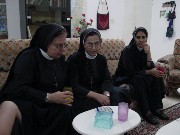 that
inside Jenin things were 'aadi - normal. At the Zababdeh taxi
stand, no one was going to Jenin, but there was a passing taxi from Tubas
that was trying to go. Marthame hopped in. Just south of the
tanks, all of the traffic turned off the main road and up into the hills
to the same spot where we had snuck our school kids home last
year. Then the "road" turned off into the dust of the olive groves.
How the under-carriage survived the journey is a mystery, due to the constant
holes and pits in the path. At one point, the car got stuck, so all
of the passengers got out and walked behind the taxi for a while until
the way was somewhat easier. "How do you like Tora Bora?" commented
one passenger. Having clean shoes here is for nought. Sure
enough, Jenin was open, stores were open, and the line at Paltel was around
the block - apparently we weren't the only ones caught between the Palestinian
utility's bureacracy, the postal service's paralysis, and the Israeli military's
death grip. Marthame also took care of some other errands in town
before heading back to Zababdeh along the same path. In the evening,
Fr. Aktham, Deacon Homam, and the three Rosary Sisters stopped by for a
visit. Between their (and our) schedules, the constant construction
work in our neighborhood, and our recent debilitating colds, we hadn't
been able to coordinate this - long overdue, but most welcome. Fr.
Aktham took an immediate interest in our Boggle Game, challenging each
of the sisters one by one. that
inside Jenin things were 'aadi - normal. At the Zababdeh taxi
stand, no one was going to Jenin, but there was a passing taxi from Tubas
that was trying to go. Marthame hopped in. Just south of the
tanks, all of the traffic turned off the main road and up into the hills
to the same spot where we had snuck our school kids home last
year. Then the "road" turned off into the dust of the olive groves.
How the under-carriage survived the journey is a mystery, due to the constant
holes and pits in the path. At one point, the car got stuck, so all
of the passengers got out and walked behind the taxi for a while until
the way was somewhat easier. "How do you like Tora Bora?" commented
one passenger. Having clean shoes here is for nought. Sure
enough, Jenin was open, stores were open, and the line at Paltel was around
the block - apparently we weren't the only ones caught between the Palestinian
utility's bureacracy, the postal service's paralysis, and the Israeli military's
death grip. Marthame also took care of some other errands in town
before heading back to Zababdeh along the same path. In the evening,
Fr. Aktham, Deacon Homam, and the three Rosary Sisters stopped by for a
visit. Between their (and our) schedules, the constant construction
work in our neighborhood, and our recent debilitating colds, we hadn't
been able to coordinate this - long overdue, but most welcome. Fr.
Aktham took an immediate interest in our Boggle Game, challenging each
of the sisters one by one. |
|
Thursday, 10/24/02: Most mornings at the school, students lead the assembly, with the Lord's Prayer, scripture, and reading a passage about a topic of general interest. And now once a week the upper grades lead the assembly in English. Today was Elizabeth's seventh graders' turn, and they did a great job. Afterwards, Fr. Aktham quizzed the 11th and 12 graders about the scripture passage, which was from Luke 17, Jesus healing the ten lepers, the site of which is revered in nearby Burqin. And he then reminded all the students that we are all too often like the ten lepers who were healed but never gave thanks. We should strive to be like the one who returned to Jesus to say thank you. By the time assembly ended, the Jenin schoolbus had not arrived, meaning our Jenin kids probably would not make it today. That means students from Jenin (including a couple of Elizabeth's eighth graders) will miss some of their half-semester exams. Our cellphone bill arrived today, unfortunately - this necessitates another trip back to Jenin at some point soon. Good news only lasts so long around here! |
|
Friday, 10/25/02: A good day for a sabbath. 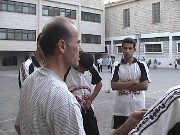 Not
much to tell - a lot of sleeping, a little bit of eating, and a concerted
effort at getting well. We're over Not
much to tell - a lot of sleeping, a little bit of eating, and a concerted
effort at getting well. We're over 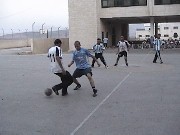 the
hump, though Marthame's visit to the Anglican clinic yesterday was only
helpful to a point - his ears are congested, and the doctor decided to
"suction" them - end result, one ear is open, the other closed - closed,
closed. Not unlike Jenin today.
The word from there is not good. Dozens of Israeli tanks, house-to-house
searches, a notched-up curfew keeping the streets empty and everyone at
home. It's claimed to be in response to the recent suicide bombing,
and not unfounded - Jenin remains a center of Palestinian defiance, including
groups that resort to terrorism. It just seems all too familiar,
that we've been here before. No one is bringing anything new to the
table, and even William Burns' presence in the region is doing little (we've
been here before, too). Meanwhile, resentment, fear, hatred, distrust,
all build and grow. Marthame went to the school in the evening to
catch a soccer match between Zababdeh and nearby Sanour. Zababdeh's
coach is hoping to send some video to some European foundations to raise
funds for the sports club. The local team spirit was evident in the
chants of "Zababdeh!" (audio - 4 sec.)
For those of you keeping score at home, the end result was a 3-3 tie under
the lights. the
hump, though Marthame's visit to the Anglican clinic yesterday was only
helpful to a point - his ears are congested, and the doctor decided to
"suction" them - end result, one ear is open, the other closed - closed,
closed. Not unlike Jenin today.
The word from there is not good. Dozens of Israeli tanks, house-to-house
searches, a notched-up curfew keeping the streets empty and everyone at
home. It's claimed to be in response to the recent suicide bombing,
and not unfounded - Jenin remains a center of Palestinian defiance, including
groups that resort to terrorism. It just seems all too familiar,
that we've been here before. No one is bringing anything new to the
table, and even William Burns' presence in the region is doing little (we've
been here before, too). Meanwhile, resentment, fear, hatred, distrust,
all build and grow. Marthame went to the school in the evening to
catch a soccer match between Zababdeh and nearby Sanour. Zababdeh's
coach is hoping to send some video to some European foundations to raise
funds for the sports club. The local team spirit was evident in the
chants of "Zababdeh!" (audio - 4 sec.)
For those of you keeping score at home, the end result was a 3-3 tie under
the lights. |
|
Saturday, 10/26/02: Marthame dressed in the clergy robe Deacon Firas gave him and went off to the garage. Since we've been here, our work has been intentionally ecumenical. This has led to confusion - Fr. Louis had introduced Marthame to the 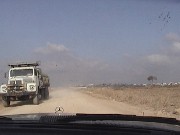 Latin
community as Deacon, while the Anglican parish has known him as Pastor.
Slowly, the ecumenical urgency of our work is reaching people - the Byzantine-style
black robe fits into both sides of the equation (confusion and definition).
Both Marthame and Firas were going to go to Jenin
to care of some errands (Marthame paying our phone bill and getting his
ear cleared up, Firas taking his driver's test) before heading on to Jalame.
Obviously, Jenin was a non-starter today, so the two of them grabbed a
taxi "directly" to Jalame - the familiar roundabout, choppy dirt road to
the Palestinian border town. Firas' new responsibilities as deacon
(and, soon to be, priest) include not only Zababdeh's Melkite community,
but also for the Christians in Jalame and Muqeible. Not more than
a quarter mile separates the two villages, but the two places couldn't
seem more apart. First was Muqeible, just on the Israeli side of
the Green Line. Our taxi delivered us to Jalame, on the Palestinian
side. We walked towards the checkpoint, not a single car to be found
on the settler bypass road - normally, there is at least a trickle of settler
traffic and a handful of Arab Israelis entering Jalame for cross-border
trade. As we walked, Firas prayed, the two of us looking like Melkite
mafia in our robes. The soldier motioned to us: "wahad, wahad
- one by one." Marthame went first, chatting with the soldier (both
were nursing colds). Firas approached, carrying his Vatican laissez-passe.
The soldier pressed Firas for another ID, knowing he must have a Palestinian
ID, meaning he could not enter Israel "for security reasons" - once a Palestinian,
always a Palestinian. But Firas did not have (wisely did not bring)
any ID other than the Vatican laissez-passe. Finally, the
soldier turned to Marthame, asking, "is he with you?" "Yes."
"OK. Go." The two arrived in the town of Muqeible at one of
the Christian homes there. The streets are wide, newly-paved, and
clean. The lawns - there are lawns here, by the way - are fresh and
green. Of Muqeible's roughly 3000 residents, 6% (about 200) are Christian.
The rest are Muslim. They are divided among three parishes: Greek
Orthodox, Melkite, and Roman Catholic. Latin
community as Deacon, while the Anglican parish has known him as Pastor.
Slowly, the ecumenical urgency of our work is reaching people - the Byzantine-style
black robe fits into both sides of the equation (confusion and definition).
Both Marthame and Firas were going to go to Jenin
to care of some errands (Marthame paying our phone bill and getting his
ear cleared up, Firas taking his driver's test) before heading on to Jalame.
Obviously, Jenin was a non-starter today, so the two of them grabbed a
taxi "directly" to Jalame - the familiar roundabout, choppy dirt road to
the Palestinian border town. Firas' new responsibilities as deacon
(and, soon to be, priest) include not only Zababdeh's Melkite community,
but also for the Christians in Jalame and Muqeible. Not more than
a quarter mile separates the two villages, but the two places couldn't
seem more apart. First was Muqeible, just on the Israeli side of
the Green Line. Our taxi delivered us to Jalame, on the Palestinian
side. We walked towards the checkpoint, not a single car to be found
on the settler bypass road - normally, there is at least a trickle of settler
traffic and a handful of Arab Israelis entering Jalame for cross-border
trade. As we walked, Firas prayed, the two of us looking like Melkite
mafia in our robes. The soldier motioned to us: "wahad, wahad
- one by one." Marthame went first, chatting with the soldier (both
were nursing colds). Firas approached, carrying his Vatican laissez-passe.
The soldier pressed Firas for another ID, knowing he must have a Palestinian
ID, meaning he could not enter Israel "for security reasons" - once a Palestinian,
always a Palestinian. But Firas did not have (wisely did not bring)
any ID other than the Vatican laissez-passe. Finally, the
soldier turned to Marthame, asking, "is he with you?" "Yes."
"OK. Go." The two arrived in the town of Muqeible at one of
the Christian homes there. The streets are wide, newly-paved, and
clean. The lawns - there are lawns here, by the way - are fresh and
green. Of Muqeible's roughly 3000 residents, 6% (about 200) are Christian.
The rest are Muslim. They are divided among three parishes: Greek
Orthodox, Melkite, and Roman Catholic.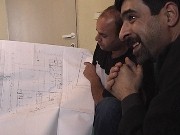 Despite the historic presence of Christians here, though, there is no church.
The community is beginning to change that, and the
Despite the historic presence of Christians here, though, there is no church.
The community is beginning to change that, and the 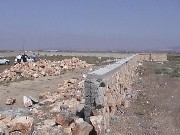 young
Christian men of the village have taken the leadership. The regional
council (Muslim, Christian, and Jewish) has given them land to build, and
they have received all the necessary permits - an amazing feat for Arabs
in Israel - and their architectural plans are drawn up. They have
already begun to build, too, walling off three sides of the church lands.
They'll need more money to complete, much more money than they can afford,
but they have at least grabbed the attention of the church hierarchy.
Firas is hoping to set up a meeting between the bishop
and these active young laymen so that work can continue apace. An
amazing story of building a church, interfaith cooperation - particularly
the support and involvement of the village's Muslim community - and lay
initiative. Their vision of the place is as a church for all three
traditions, served by whomever can serve. It'll be interesting to
see where the hierarchy can embrace this remarkable ecumenical vision.
The order of Muqeible was soon traded for the disorder of Jalame (after
one border crossing and a pat-down security check of two clergy) - houses
built tightly together, garbage strewn about, little emphasis on municipal
planning. Asking around, we soon found one of the Christians of Jalame
- who number 70 in a village of 2000. They, too, have an historical
presence here, but no young
Christian men of the village have taken the leadership. The regional
council (Muslim, Christian, and Jewish) has given them land to build, and
they have received all the necessary permits - an amazing feat for Arabs
in Israel - and their architectural plans are drawn up. They have
already begun to build, too, walling off three sides of the church lands.
They'll need more money to complete, much more money than they can afford,
but they have at least grabbed the attention of the church hierarchy.
Firas is hoping to set up a meeting between the bishop
and these active young laymen so that work can continue apace. An
amazing story of building a church, interfaith cooperation - particularly
the support and involvement of the village's Muslim community - and lay
initiative. Their vision of the place is as a church for all three
traditions, served by whomever can serve. It'll be interesting to
see where the hierarchy can embrace this remarkable ecumenical vision.
The order of Muqeible was soon traded for the disorder of Jalame (after
one border crossing and a pat-down security check of two clergy) - houses
built tightly together, garbage strewn about, little emphasis on municipal
planning. Asking around, we soon found one of the Christians of Jalame
- who number 70 in a village of 2000. They, too, have an historical
presence here, but no 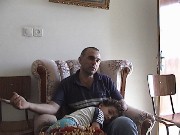 church,
and they are closely related to Christian families in Muqeible and Jenin.
Ministerial responsibility has usually fallen to the clergy of Jenin, but
the last two years have church,
and they are closely related to Christian families in Muqeible and Jenin.
Ministerial responsibility has usually fallen to the clergy of Jenin, but
the last two years have 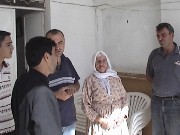 changed
that. No priest has visited in six months, and they haven't had Christmas
or Easter celebrations in a while. All of the usual Arab Christian
trappings are found in the home - pictures and statues of Christ, the holy
family, and St. George; a variety of crosses and crucifixes. Home
is the place of prayer and Christian education here. Several years
ago, the municipality gave Christians land for a graveyard (for years they
have had to be buried in other Christian cemeteries), but some of the villagers
resented the placement of it near their homes and businesses - the municipality
relented, and the community remains without. The contrast between
the two towns couldn't be more striking. After lunch back in Zababdeh,
Marthame went down to Tubas to see an ear
doctor - it's a large enough village for specialists, and Jenin won't open
anytime soon. To make a long story short, he's hearing again in that
ear. Jenin may be closed, but at least Marthame's ear is open.
Now if they would only open local utility offices in Tubas so we could
pay our phone bill! In the evening, Marthame and Firas spent time
on the internet trying to connect with churches - particularly Melkite
ones - who would be interested in being in relationship with Zababdeh.
The Bishop of Haifa has provided some financial
support to the church, but not enough to rebuild. In this economic
environment (if one can call it that), the idea of Zababdeh building on
its own is absurd. So Deacon Firas is turning to the West - as he
puts it, the place that "we evangelized." changed
that. No priest has visited in six months, and they haven't had Christmas
or Easter celebrations in a while. All of the usual Arab Christian
trappings are found in the home - pictures and statues of Christ, the holy
family, and St. George; a variety of crosses and crucifixes. Home
is the place of prayer and Christian education here. Several years
ago, the municipality gave Christians land for a graveyard (for years they
have had to be buried in other Christian cemeteries), but some of the villagers
resented the placement of it near their homes and businesses - the municipality
relented, and the community remains without. The contrast between
the two towns couldn't be more striking. After lunch back in Zababdeh,
Marthame went down to Tubas to see an ear
doctor - it's a large enough village for specialists, and Jenin won't open
anytime soon. To make a long story short, he's hearing again in that
ear. Jenin may be closed, but at least Marthame's ear is open.
Now if they would only open local utility offices in Tubas so we could
pay our phone bill! In the evening, Marthame and Firas spent time
on the internet trying to connect with churches - particularly Melkite
ones - who would be interested in being in relationship with Zababdeh.
The Bishop of Haifa has provided some financial
support to the church, but not enough to rebuild. In this economic
environment (if one can call it that), the idea of Zababdeh building on
its own is absurd. So Deacon Firas is turning to the West - as he
puts it, the place that "we evangelized." |
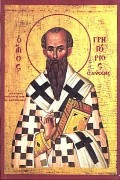 Sunday,
10/27/02: One of the Americans teaching at the Arab-American
University of Jenin joined us this morning as we went to worship.
He came here out of a commitment to get to know Palestinian culture, particularly
Palestinian-Christian culture, first-hand. He has been developing
his own webpage,
too (Zababdeh is thinking of passing a municipal law that foreigners who
come here to live are required to make webpages). We arrived
late at St. George's Greek Orthodox church (1/2 hour into the service),
but still managed to beat most of the crowd. This time of year, the
olive harvest usually thins out the congregation a bit. As Marthame
sat with him, he tried to explain what was happening during the service
(Elizabeth was sitting across from them, on the women's side of the aisle,
as the church maintains the custom of men and women sitting separately).
Explaining the liturgy was both encouraging (for how much we've learned)
and discouraging (for how much we have left to know). But to put
a bright spin on it, the mystery still remains. Marthame has been
reading early Christian history books in anticipation of teaching next
semester in Ibillin, and the issue of
icons has jumped out at him. Prior to the Reformation, there were two major
iconoclastic controversies. Citing the Second Commandment forbidding "graven
images," many church leaders (and political) sought to cleanse churches
of religious imagry. The two controversies were resolved in 787 (at
the Second Council of Nicaea) and 843, and in both cases the decision in
favor of iconography boiled down to the issue of incarnation: the material
representation of heavenly figures affirmed that God became human - became
material - in Christ. To forsake icons was to deny the possibility
of incarnation. Incarnation to the Western Christian is not a hot
topic, but here, where the majority Muslim population rejects the doctrine,
it is still a live issue. A different framework altogether. Sunday,
10/27/02: One of the Americans teaching at the Arab-American
University of Jenin joined us this morning as we went to worship.
He came here out of a commitment to get to know Palestinian culture, particularly
Palestinian-Christian culture, first-hand. He has been developing
his own webpage,
too (Zababdeh is thinking of passing a municipal law that foreigners who
come here to live are required to make webpages). We arrived
late at St. George's Greek Orthodox church (1/2 hour into the service),
but still managed to beat most of the crowd. This time of year, the
olive harvest usually thins out the congregation a bit. As Marthame
sat with him, he tried to explain what was happening during the service
(Elizabeth was sitting across from them, on the women's side of the aisle,
as the church maintains the custom of men and women sitting separately).
Explaining the liturgy was both encouraging (for how much we've learned)
and discouraging (for how much we have left to know). But to put
a bright spin on it, the mystery still remains. Marthame has been
reading early Christian history books in anticipation of teaching next
semester in Ibillin, and the issue of
icons has jumped out at him. Prior to the Reformation, there were two major
iconoclastic controversies. Citing the Second Commandment forbidding "graven
images," many church leaders (and political) sought to cleanse churches
of religious imagry. The two controversies were resolved in 787 (at
the Second Council of Nicaea) and 843, and in both cases the decision in
favor of iconography boiled down to the issue of incarnation: the material
representation of heavenly figures affirmed that God became human - became
material - in Christ. To forsake icons was to deny the possibility
of incarnation. Incarnation to the Western Christian is not a hot
topic, but here, where the majority Muslim population rejects the doctrine,
it is still a live issue. A different framework altogether. |
|
Monday, 10/28/02: A delegation of British diplomats stopped by the school today. They're doing some information gathering - how official, we're not sure - and wanted to hear how the situation is affecting the school. Well, the Jenin kids are still absent - curfew for them is still brutally imposed. In many 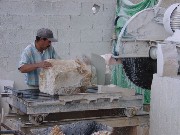 ways,
in Zababdeh we've been very blessed over the last two years - but no one's
been unaffected by the situation, even in our sleepy little town.
This morning, the Israeli army came to arrest two young men living in the
village. People are cut off from work, health care, commerce, trade...We
can't even do something as simple as paying our phone bill. "Collective
punishment" is a phrase one often hears about the situation affecting the
Palestinians, and there's no more appropriate description. For the
militancy of some the entire population suffers, and suffers greatly.
The folks bringing the delegation had called us before coming, asking if
there was anything they could bring us. Our request for cheese was
fulfiled beyond all expectation; we are now well-stocked with cheeses (both
fancy ones and the kinds that melt!), ways,
in Zababdeh we've been very blessed over the last two years - but no one's
been unaffected by the situation, even in our sleepy little town.
This morning, the Israeli army came to arrest two young men living in the
village. People are cut off from work, health care, commerce, trade...We
can't even do something as simple as paying our phone bill. "Collective
punishment" is a phrase one often hears about the situation affecting the
Palestinians, and there's no more appropriate description. For the
militancy of some the entire population suffers, and suffers greatly.
The folks bringing the delegation had called us before coming, asking if
there was anything they could bring us. Our request for cheese was
fulfiled beyond all expectation; we are now well-stocked with cheeses (both
fancy ones and the kinds that melt!), 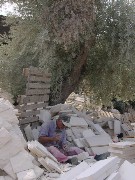 chocolate
chip cookies, and other non-Zababdeh delicacies. Unfortunately, Elizabeth
wasn't able to meet with the group. Fortunately, it was for a good
reason. She was tapped to accompany the sixth graders on a field
trip to nearby Misilye to visit a stonecutting factory. Two years
ago, they would've been on their way to Nablus
or even into Israel (perhaps to the Sea of Galilee or Haifa) - today, a
five minute drive to Misilye is the most that can be done for a field trip.
The kids were bouncing off the walls of the bus, so very excited to go
anywhere at all. We pulled up into one of several stonecutters' shops
which line the road to Misilye. Two friendly men explained to the
kids how the get the chocolate
chip cookies, and other non-Zababdeh delicacies. Unfortunately, Elizabeth
wasn't able to meet with the group. Fortunately, it was for a good
reason. She was tapped to accompany the sixth graders on a field
trip to nearby Misilye to visit a stonecutting factory. Two years
ago, they would've been on their way to Nablus
or even into Israel (perhaps to the Sea of Galilee or Haifa) - today, a
five minute drive to Misilye is the most that can be done for a field trip.
The kids were bouncing off the walls of the bus, so very excited to go
anywhere at all. We pulled up into one of several stonecutters' shops
which line the road to Misilye. Two friendly men explained to the
kids how the get the 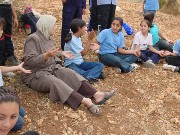 stones,
and demonstrated how the sontecutting machines work, spraying water on
the boulder as it is forced against a circular saw (video
- 32 sec.). Then the pieces are cut into standard shapes, most of
them seemed to be thin rectangles for facing buildings. One man was
sitting amid piles of these small slabs, pounding away with a hammer, chipping
different patterns into the stone face. "We have three models," said
the man: large sesame, small sesame, and something Elizabeth couldn't
understand. After the full tour, we boarded the bus again and went
to the nearby Naim Khader Agricultural Center, where the kids got another
tour and then had a small picnic, played a little soccer and a competitive
patty-cake game (audio - 13 sec.) which
Elizabeth picked up pretty quickly. The news is full of Moscow and
Chechnya. The perspective of a people under occupation is helpful
- as one friend remarked, "If he's willing to use gas on his own people,
what must he be doing to the Chechyns?" But another item came across
as well (in addition to CNN's wall-to-wall
American sniper coverage): the American diplomat assassinated in Jordan.
Worrisome to say the least... stones,
and demonstrated how the sontecutting machines work, spraying water on
the boulder as it is forced against a circular saw (video
- 32 sec.). Then the pieces are cut into standard shapes, most of
them seemed to be thin rectangles for facing buildings. One man was
sitting amid piles of these small slabs, pounding away with a hammer, chipping
different patterns into the stone face. "We have three models," said
the man: large sesame, small sesame, and something Elizabeth couldn't
understand. After the full tour, we boarded the bus again and went
to the nearby Naim Khader Agricultural Center, where the kids got another
tour and then had a small picnic, played a little soccer and a competitive
patty-cake game (audio - 13 sec.) which
Elizabeth picked up pretty quickly. The news is full of Moscow and
Chechnya. The perspective of a people under occupation is helpful
- as one friend remarked, "If he's willing to use gas on his own people,
what must he be doing to the Chechyns?" But another item came across
as well (in addition to CNN's wall-to-wall
American sniper coverage): the American diplomat assassinated in Jordan.
Worrisome to say the least... |
|
Tuesday, 10/29/02: At 3:00 this morning, the army entered Tubas and began their activity. Our bus arrived, having passed right by the army in the process, but the teachers and students arrived not knowing exactly what was happening to the rest of their village while they were at school. Hopefully it'll be over quickly. |
|
Wednesday, 10/30/02: Be careful what you wish for. Yesterday, the Israelis learned the whereabouts of a wanted Hamas activist from Tubas. He had been hiding out in his cousin's home. They surrounded the house, used his father and brother as human shields, and entered the house. When he surrendered, they killed him. They also destroyed large portions of the house in the process. No one denies his political activities or affiliations. No one denies that he was wanted - for six months now, he has evaded capture. But forget due process when it comes to Palestinians - whether cold-blooded assassinations or indefinite, charge-less "administrative detention" of prisoners, Palestinians aren't granted the most basic of human rights. The war crimes of the Palestinians - the suicide bombings, the armed attacks on citizens - are paraded before the world, and rightly so. But those of the Israelis don't even warrant news coverage - they're that common. Status quo. At school we also learned disturbing news that last night one of Zababdeh's liquor store owners was shot in what seems to be a theft/hold-up. Men came in and started taking bottles, and when they were pressed for payment, they shot up the store a bit, hitting the owner in the lower jaw. They sped off as the man's family came to see what happened. He eventually got to a hospital in Haifa several hours later (hold-ups at checkpoints are par for the course) and is alive but with a severely damaged jaw. We have been frankly surprised that the decimation of the PA infrastructure and police force hasn't resulted in more crime like this. But maybe that's just because we're from Chicago. Here it seems that intact and strong family and clan ties running through and across villages tend to keep such things in check naturally. Maybe, but many people were very distressed by this. On a happier note, today we also learned that Fr. Hosam, the Anglican priest of Zababdeh and Nablus, will be traveling to the States next week, speaking in Chicago. We couldn't be more pleased. He is not only compassionate, eloquent, and faithful, he is also a good friend. We hope a lot of people take advantage of his presence to hear his first hand account of Christian life and ministry these days, particularly under curfew in the besieged city of Nablus. The curfew in Jenin was lifted between 2 and 6 in the afternoon - four hours of "freedom". Perhaps our kids from there will be back tomorrow. In the evening, Marthame was walking through the village as F-16s flew overhead - not unusual, it happens regularly. Not long after they flew off to the South, there was a bright flash from over the hills. Marthame assumed something was being bombed in Tubas. But when the rains came, we knew it was lightning. Sometimes it's hard to tell! |
|
Thursday, 10/31/02: After a late night putting the finishing touches on our latest update, we went to school, half-expecting to find the Jenin students around. No such luck - the lifting of the internal siege was for four hours, and four hours only. Not only that, but our Qabatia teachers and students were absent. Three tanks left the edge of Qabatia by way of the military/settler bypass road, but by 10:00 it was too late to bring kids to school. Ugh. 689 |
|
|